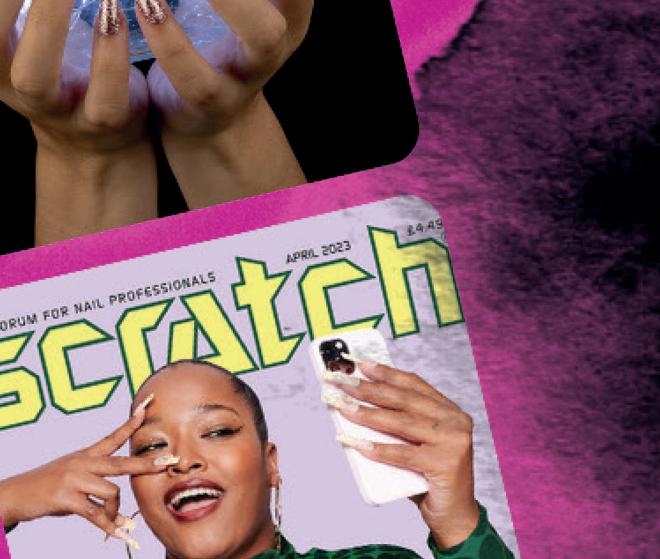
















What can be done to tackle the recruitment crisis?
P26: VAT REFORM


Exploring the options proposed in the VAT smoothing project
P32: HAIR LOSS
The truth about trichotillomania and how to help clients

P35: COMPETITIONS
You’ve got to be in them to win them, but are they worth it?


P41: STRATEGY
Business planning advice and top tips for success






















5 Hello and welcome Chief executive Caroline Larissey on the hot topics of conversation across the sector
6 The 14 things you need to read this issue
From the NHBF’s response to the cancelled T level to the latest State of the Industry Survey results and tips on using Canva
20 Recruitment
With a lack of both experienced staff and apprentices, what can be done about the sector’s recruitment crisis?




38




26 VAT reform

Explaining the proposed options in the VAT smoothing mechanism project
29 Health hubs
The sector businesses offering extra health services to their clients and communities
32 Hair loss: part 2 How much do you know about trichotillomania?
35 Competitions
Exploring the pros and cons of entering industry competitions
38 Sustainability
Do you really understand the meaning behind the eco-terms and logos?
41 Strategy
Why a clear, concise and up-to-date business strategy is key to success
44 How to...
Give and take

26

46 Mood board
Showing off the great work being created by Members
48 What’s trending
Pinterest predictions, piqued interest in waxing, and the future of aesthetics
50
60 seconds with... Award-winning entrepreneur Gail Waterman
...
























































The
THE NHBF
One Abbey Court Fraser Road
Priory Business Park Bedford MK44 3WH 01234 831965 nhbf.co.uk sfenquiries@salonfocus.co.uk
CHIEF EXECUTIVE
Caroline Larissey
DIGITAL MARKETING DIRECTOR
Samantha Turner-Meyern
EDITORIAL
Editor Hollie Ewers hollie@salonfocusmagazine.co.uk
Content sub-editors James Hundleby, Kate Bennett, Amy Beveridge
DESIGN
Art Editor Tom Shone Picture researcher Jessica Marsh
ADVERTISING advertising@salonfocusmagazine.co.uk 020 7880 6230
PRODUCTION
Production director Jane Easterman
Account director Joanna Marsh joanna.marsh@redactive.co.uk
PRINTER Manson Group, St Albans
COVER ILLUSTRATION
Shutterstock
© The NHBF 2024
All views expressed in salonfocus are not necessarily those of the NHBF. All efforts have been taken to ensure the accuracy of the information published in salonfocus However, the publisher accepts no responsibility for any inaccuracies or errors and omissions in the information produced in this publication. No information contained in this publication may be used or reproduced without the prior permission of the NHBF.
Recycle your magazine’s plastic wrap. Check your local LDPE facilities to find out how.









Iam delighted, as the newly appointed NHBF chief executive, to be welcoming you to the latest edition of salonfocus. It must be said, it’s also great to finally feel the first throes of spring and the hope and optimism the new season potentially brings.
The last few months have been pretty hectic addressing some of the hot and controversial topics of conversation across the sector. Most notably, the ‘VAT issue’ has been at the top of the list, and rightly so, as the NHBF has been calling for an urgent VAT reform for the last 15 years. So, it was pleasing to see the government finally taking some action on one of our calls for change and raising the VAT threshold in the Spring Budget, however there is more to do. On page 26, we explain the NHBF's latest VAT smoothing discussion paper, which was put to the government, and outlines the different options that could help to make the UK VAT system fairer for all.
Another heated topic is recruitment. In the cover feature on page 20, we take a look at the factors contributing to the sector’s current recruitment crisis and





IT WAS PLEASING TO SEE THE GOVERNMENT FINALLY TAKING SOME ACTION
we discuss the possible solutions.
Despite some of this issue’s slightly contentious topics, it’s great to look at the positive parts of the sector – in particular industry competitions, which showcase and celebrate amazing talent (see page 35). We also highlight on page 29 how some salons and barbershops are at the heart of their communities for more reasons than just a haircut or beauty treatment. The schemes running at these businesses are protecting and saving lives, which is amazing and something to be immensely proud of.
Keeping on the subject of health, be sure to look out for the Every Mind Matters insert with this issue, which you can use in your business to help promote good mental health – see more on page 17.
Lastly, I’d like to ask you to help us out by taking part in the salonfocus readership survey to share your thoughts, ideas and opinions on your membership magazine. Simply scan the QR code on page 19 and you could also be in with a chance of winning a prize, so good luck!






























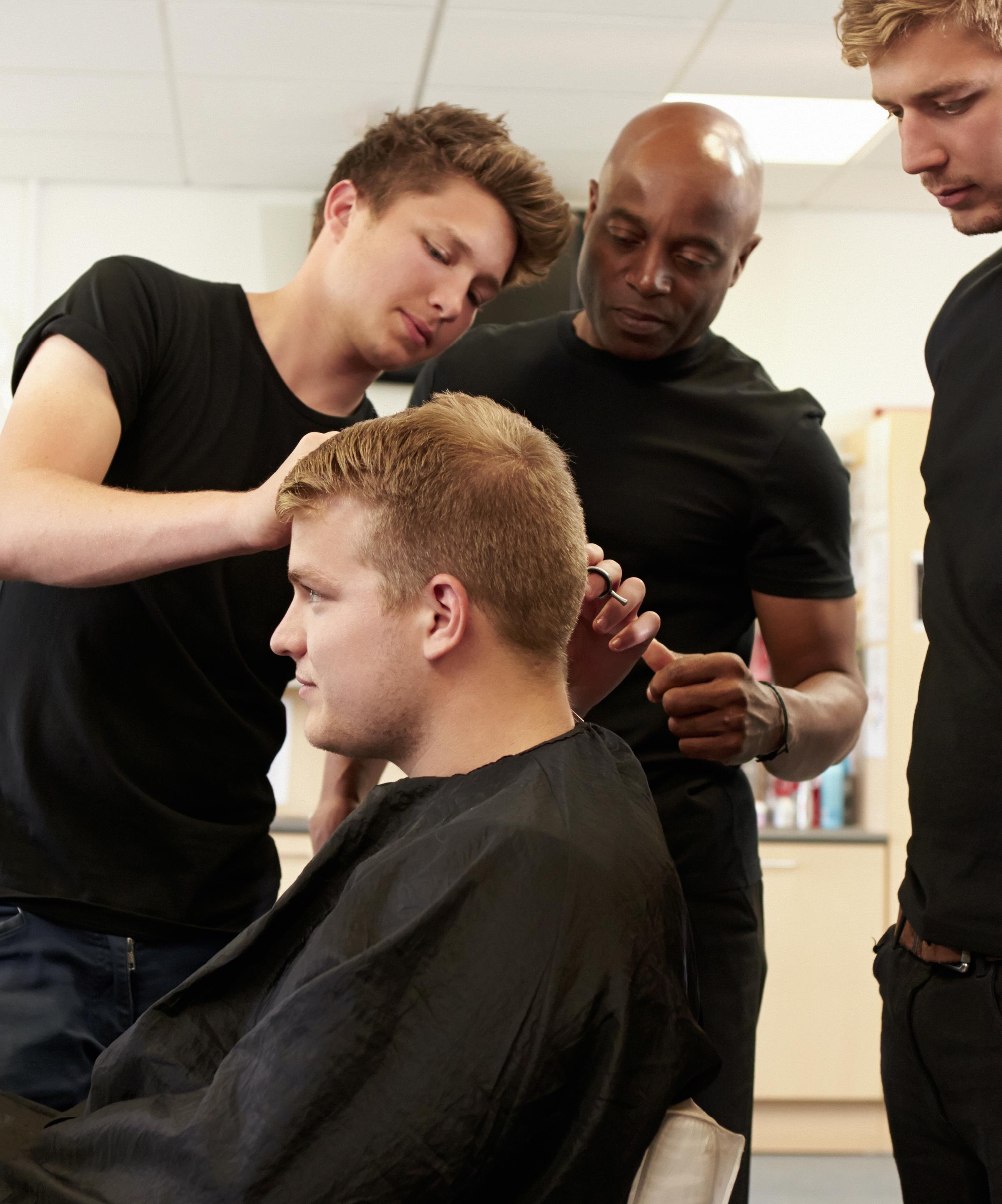

The combined hair, barbering and beauty therapy (HBBT) T level has been scrapped by the government following lobbying and feedback from the NHBF and hair and beauty employers.
Instead, the Department for Education (DfE) has decided to separate the HBBT T level and will explore introducing a beautyspecific T level with a focus on science that is expected to launch after 2025.
The decision was made after conflicting discussions with industry bodies from the beauty and hair sectors on the proposed HBBT qualification.
While beauty representatives
NHBF chief executive Caroline Larissey says: ‘Following several meetings, where we outlined the concerns of our Members, we are pleased that the minister has listened and taken on board our recommendations to support our sector.
‘Employers from hair salons and barbershops will always prefer that a prospective employee should enter the sector via a “job ready” route or qualification, such as an apprenticeship or through an equivalent college-based level 2 qualification.
‘Emerging findings from our latest State of the Industry Survey in January show that finding experienced staff and apprentices is still a major barrier to growth for the sector.’
highlighted that a good quality level 3 classroom-based progression route is desirable, feedback from hairdressing and barbering professionals differed.
Representatives from the hair industry stressed that the best route for learners to progress into their sector is by completing an existing level 2 or level 3 apprenticeship or an equivalent qualification.
The decision not to roll out the HBBT T level will mean that from September 2024 there will be no T level foundation year for the hair and beauty route.
The DfE acknowledged the decision would be disruptive for some and, to support apprenticeships in the hair sector, it announced funding uplifts of 57% for the level 2 hairdressing professional standard (from £7000 to £11,000), and 28% for the level 2 barbering apprenticeship (from £7000 to £9000).
Read more on the decision at nhbf.co.uk/t-level-decision
IMAGE: SHUTTERSTOCKA survey of 2000 UK adults by Capital Hair and Beauty found that 80% spent £1200 per year on treatments, and the top five professional treatment areas were:
➤ HAIR 85%
➤ NAILS 19%
➤ EYEBROWS 16%
➤ MASSAGE 14%
➤ FACIALS AND AESTHETICS 9%
Millennials emerged as those with the most cash for beauty treatments, with a fifth spending up to £400 per month. Regular nail extensions appear most important to Gen Z, at 21%. Facial beauty treatments in particular were deemed services that should only be carried out by professionals.
CASHLESS CULTURE
New research reveals an appetite for automation among salon owners and clients. Global technology company Square surveyed UK business owners and consumers, with key findings:
£4.6bn
of revenue in the hair and beauty sector has been projected over the next five years, according to global market researcher IBISWorld.
Haircuts, colour and highlights were the most popular services over the past year, accounting for more than half (55%) of annual industry revenue. This comes as a survey by Vagaro, which analysed the data, suggests that 85% of salon and barbershop owners have raised service prices due to inflation – while almost half (49%) of respondents said wholesale costs had increased by more than 10%.
However, consumer demand remains high: data shows that bookings for haircuts in 2023 increased by almost a quarter (23%) for women and a fifth for men.
The new National Living Wage for eligible workers is £11.44, it’s been announced. An increase of 9.8%, the new rate takes effect on 1 April and, for the first time, will include 21- and 22-year-olds.
The National Minimum Wage rates will also increase for young people and apprentices:
• For ages 18-20 it will rise by 14.8% to £8.60 an hour
• For ages 16-17 and apprentices it will rise by 21.2% to £6.40 an hour.
Read more at gov.uk/national-minimum-wage-rates
£11.44
69%
• Beauty business owners are particularly interested in contactless payments – 45% in the UK compared with 30% globally.
• Just 14% of customers want phone call reminders for appointments.
• In addition, retail insights from the research suggest that almost half (49%) of Brits typically shop online, and almost half (45%) of UK purchases were made online in December.



The recovery of the sector has been ‘slow and steady’ through 2023 and into January 2024, according to latest NHBF State of the Industry Survey results.
The key findings reveal:
PROFIT/LOSS
● 20% of businesses are now reporting losses (up from 14% in September 2023)
● 40% are making a small or good profit (down 5%)
● 58% are either partially or completely reliant on government support (up from 56%).
● 70% of businesses are most concerned about energy costs
● 66% are paying more for energy than they
were six months ago
● 67% of businesses are concerned about National Minimum Wage/National Living Wage – this is the highest level recorded.
The workforce has stayed the same over the last three months for more businesses. However, recruitment intentions have taken a dip. In the next three months:
● Only 17% (down from 27%) were definitely or likely to take on new staff
● Only 9% of businesses (down from 20%) would take on apprentices.
● 72% of businesses are confident of their survival
● 46% (up from 40%) of businesses expect
turnover to stay the same over the next three months.
The current economic conditions are still the biggest challenge for sector businesses, although this has eased slightly since September 2023 (from 68% to 66%). Businesses still have issues with recruiting experienced staff (43%) and finding apprentices (23%) – something that concerns NHBF chief executive Caroline Larissey. She said: ‘The sector recovery is slow, but of most concern is the dip in businesses intending to take on staff and apprentices, as we rely on a pipeline of young talent entering our sector.’
Access the full report at nhbf.co.uk/ rising-costs


Treatment recommen m
Treatment for alopecia areata is being recommended on the NHS for the first time. The medicine comes in the form of a daily pill and couldhelp up to 14,000 in England alone.

people in W t sear on it


With more than 950 million searches on TikTok, it seems big hair is back Described as the antithesis of the ‘pared-down aesthetic’, a bouffant finish is set to be on more clients’ wish lists. The back-brushed look was spotted on Miley Cyrus at the Grammys.
Beauty brands are offered a new way to cut their packaging output, thanks to the expansion of refillable packaging platformReposit in M&S stores. The incentivising recycling scheme has been used by more than 10,000 M&S customers to date.


Fireas ahaircutting technique is unlikely to catch… light. A barber in India used the unusual method in a viral video, in which he sprays the client’s hair with an unknown product and repeatedly sets it aflame. Not recommended!





Men expe dem in 20 pro 41% inc hea s year. p i s donated

Mental health support is expected to top the list of demands by employees in 2024. A survey of HR professionals revealed 41% of employers expect increased demand for mental health support this year.



While we’re all for recycling, would you wear clothes made of human hair? The Dutch company Human Material Loop is creating yarns from hair cutt by hair salons.
























How can I ensure a successful 2024 compared with 2023? I want this year to be different – any suggestions?

Beverley Bates, NHBF Board member, says: To achieve success, you need to set a clear vision and goal for how you want to live your life and the ‘why’ behind your business, and be specific with your goals. Make space and time for some clear thinking because clarity is key. Try this exercise – have these questions printed where you can see them daily and answer them to yourself:
● What were your moments to be proud of in 2023?
● What did you not achieve in 2023 and why?
● What are the most significant roles for you to play in 2024?
● What are your top three goals for each role and why are they important?
● What daily rituals do you need to commit to to make these goals a reality?
● What do you need to stop doing to make these goals a reality?
This last question is important because a ‘successful’ mentality involves taking responsibility for our own behaviours. For example, one big challenge is time management – are you constantly checking your phone for notifications throughout the day? Phones can be quite addictive, and this can be detrimental to our time and business – before you know it, you’re sucked down the social media rabbit hole, which can also leave you lacking confidence if you are comparing yourself to others. Tackling just this one area could transform both your productivity and self-esteem.
Finally, think about who you need to be in order to achieve success and decide which behaviours you’re going to adopt for the better. I wish you every success!
As well as being an NHBF Board member, Beverley is a salon consultant and educator, director of The Retreat at Ekko Ltd, and the founder and director of Mind for Business.

Globally renowned nail artist Kirsty, who has her own product range and nail academy, placed fifth in the NHBF’s Top 100 Index 2023.
I am incredibly honoured and grateful to have been recognised. It’s testament to the hard work and dedication I have put into my craft, and I am thrilled to be among such talented individuals.
I’ve always had a passion for the beauty industry, and I started my journey as a beauty therapist. However, it was when I discovered the art of nail design that I truly found my calling. The intricate designs and endless possibilities fascinated me, so I dedicated myself to mastering the craft and building my skills as a nail artist – there was no turning back.
I have the opportunity to transform nails into works of art, and seeing the smiles on my clients’ faces when they look at their beautifully designed nails is incredibly rewarding.
Building a successful brand and becoming a recognised influencer in the nail industry. I have also been able to inspire and educate others in the field of nail art. It’s a privilege to be able to make a positive impact on the industry and the lives of fellow nail artists.
WHAT CONTENT GETS THE MOST REACTION?
In my experience, content that showcases unique and intricate nail designs tends to get the most reaction from my audience. People are always looking for new and innovative ideas, and when I share designs that push the boundaries of nail art, it generates a lot of excitement and engagement.
WHAT INFLUENCES YOU?

WHAT’S KEY TO YOUR SUCCESS?
A combination of passion, perseverance and continuous learning. I believe that staying true to my passion for nail art and constantly pushing myself to improve and learn new techniques has been instrumental in my brand’s success. Additionally, building a strong online presence and connecting with my audience through social media has played a significant role in expanding my reach and influence.
I draw inspiration from other talented nail artists and fashion designers, and even nature itself inspires me to push the boundaries of my creativity. I am constantly seeking new ideas and techniques to incorporate into my work.
WHAT MIGHT PEOPLE NOT KNOW ABOUT YOU?
I’m a keen roller skater and football coach.
WHAT’S PLANNED FOR 2024?
I will be launching new collections of nail products and collaborating with other brands to create innovative and highquality nail art supplies. I also plan to host more workshops and masterclasses to share my knowledge and techniques with aspiring nail artists. Additionally, I will be focusing on creating more engaging and informative content on my social media platforms, including tutorials, tips and behind-the-scenes looks at my creative process.
My goal for 2024 is to keep pushing the boundaries of nail art and making a positive impact on the industry.
NHBF rating: 5/100
IG: @kirstymeakin Followers: 258k
TT: @kirsty_meakin Followers: 89.2k
Top TT post likes: 3.8m
MEET7
NHBF digital marketing assistant Yvonne Doffour shares her top five tips for using the graphic design app Canva.

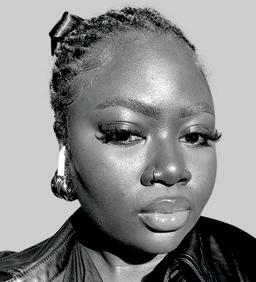
If you’re new to Canva, the multitude of options on its website can be overwhelming.
Even as a daily user, I’m always discovering new features and continually learning how to apply them. To save you time, here are a few tips that can instantly elevate your content and make your brand look more cohesive and appealing to the consumer eye.
1
PREMADE TEMPLATES
The best things about Canva are the premade templates. Small businesses can easily find multiple templates for their business needs, such as price lists, flyers, social media content and website design. When using the search bar, I recommend using descriptive keywords such as ‘modern’ or ‘beauty’ for results that will align with your brand’s style.
As a business owner, keeping track of your brand’s logo, colour scheme and font details can be overwhelming. Ease your workload and streamline your design process by storing these
elements in your ‘brand kit’. That way, you can easily access your brand elements from the sidebar whenever you’re designing.
When choosing brand fonts, consider whether they complement each other. Opting for two contrasting fonts that suit each other is a great way to define your brand. Fonts have distinct personalities, and you want to choose ones that reflect your brand’s tone of voice while maintaining readability.
When feeling lost, remember that inspiration is everywhere,
especially with powerful search engines such as Google and apps like Pinterest. To boost your creative juices, save content you come across on Pinterest, Instagram and Canva that you like. This way, whenever you are struggling or want something new, you can go back to those saved pieces and see what suitable elements you can adapt to your designs.
This tool is a lifesaver! Before discovering it, I used to spend ages manually aligning text and graphics. To save time, select your elements and click ‘position’. A sidebar will come up where you can select whichever alignment is the best for your design.






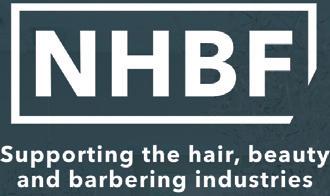






Havingsomuchgoingoninyoursalonmakesiteasytorushthroughyourinsurancerenewal, whichcanresultinunderestimatingthelevelofprotectionyouneed.Weareheretohelpyou arrangethecoverthatisrightforyou,soyourbusinessandlivelihoodareprotectedshould theworsthappen.
Joinover 1,500NHBFmembers andbenefitfrom:
Dedicatedandexperiencedteam
Membersreceivea10%discountofftheirtotalpremium
Flexiblerecordkeepingoptions
Enhancedequipment&stockcover
"Jenstengoaboveandbeyondtoensuremysalonissufficientlyprotected.Ihavebeen
CarolineBaughan,CarolineMitchell'sHairdressing&BeautyLtd




The Grand Beauty salon in Germany is challenging prejudices by working with experts who have a refugee or migrant background. Artist and founder Frauke Frech explains more about the initiative.
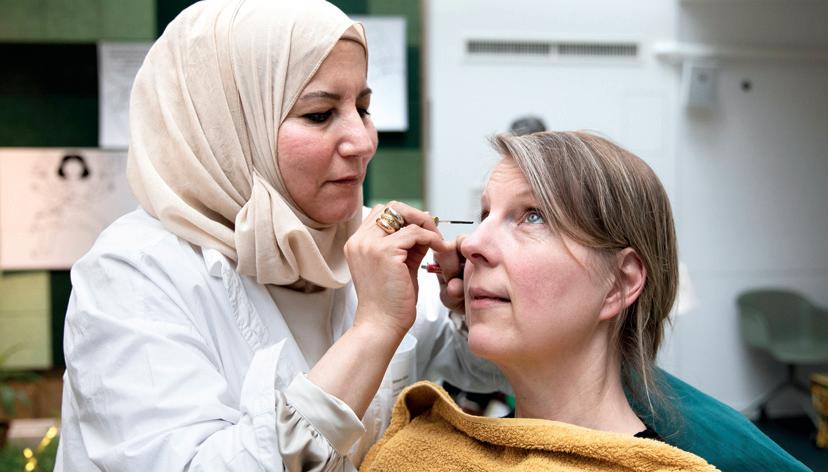





When and how did it start?
It started in 2014, the summer before a big migration wave entered Europe. I was on an artist residency at the Grandhotel Cosmopolis in Bavaria and, as a group of activists with different fields of expertise, we wanted to offer a solution to help society cope with migration.






How could we find a way to live together, where people who come to the country could use their abilities and professional knowledge? Here in Germany, the arts sector has a lot of freedom by law, so we set up the salon as an art project. People bring their skills and passion, while I give them a platform to do it. We have professionals from Iran, Macedonia, Gambia, Afghanistan, Syria, Venezuela and Germany. They’re all very happy to have the opportunity to become active in our society through their expertise.
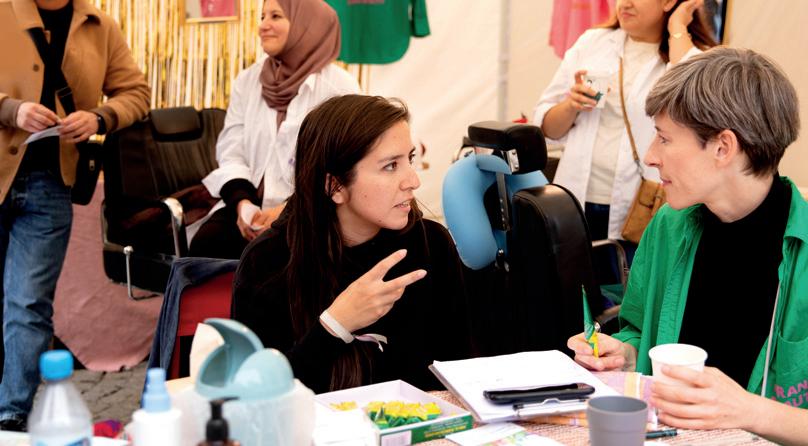

increasedmigration,clientsarefar
How is the project benefiting the migrants themselves and the wider community?
Since 2020, and certainly since Covid, we’ve had a big recruitment crisis in the beauty and hairdressing industry in Germany – it is lacking so many experts. On the other hand, due to
increased migration, clients are far more diverse than before. But in hair and beauty schools, students aren’t learning how to deal with so many different hair types, for example. So, with these two issues – the lack of workers and the diversity of clients – what can we do to bring those together? Grand Beauty is working on offering a solution.
How is the salon challenging stereotypes about migrants and asylum seekers?
It encourages people to question their prejudices. At our salon, clients have, for instance, the opportunity to speak

to a Muslim woman about her reasons for wearing a headscarf during a treatment. But another of our experts is a Muslim woman who doesn’t wear a headscarf. So, we can start conversations about how diverse the reality is compared with what people learn from the media. It’s all about what we experience together and what you can see in someone when the inside and the outside beauty come together.
Are there any downsides?
While it’s great that Grand Beauty is in demand for pop-ups at festivals and workshops and we now have a permanent salon, the situation is also frightening sometimes [due to hostility towards immigrants]. I am responsible for my team, and you never know – there could be an attack aimed at them. Luckily, it hasn’t happened yet. And of course, we have strategies in place to avoid something like that.
What’s the key message?
In the end, I think if you open your mind, then we could all profit so much from migration.
For more on Grand Beauty, watch a report at bit.ly/Info-Migrants-GrandBeauty, visit grandbeautyontour.org or follow @grand.beauty.on.tour
Take a look at what members of the NHBF team have been up to since the last issue.
It was a great day at NHBF HQ as our senior management team and NHBF Board members gathered to delve into future plans and ways to elevate our membership offering, empowering our valued Members with the right tools to run safe, legal and profitable businesses.
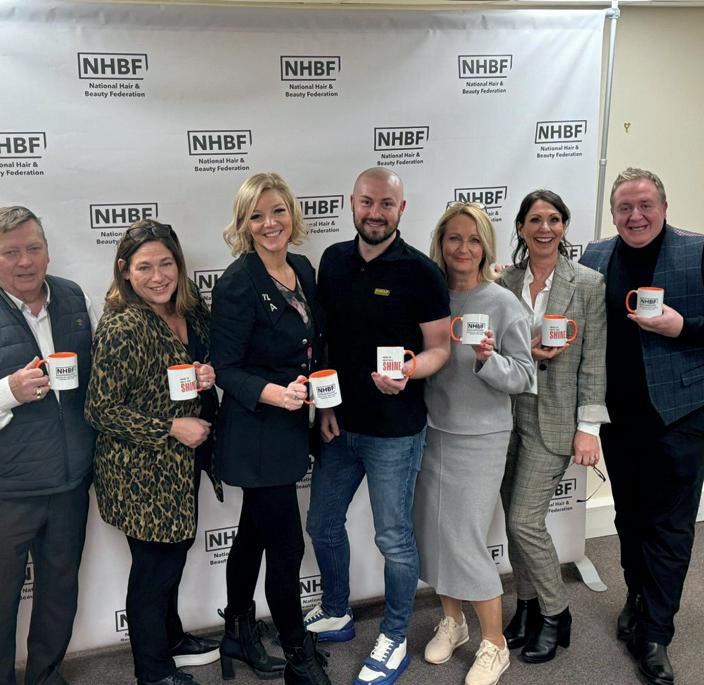

It was great to hear from Lord Parkinson and Thierry Cheval (both pictured) at the L’Oreal-hosted Notre Dame de Paris exhibition at Westminster Abbey. We also got to catch up with some industry pals from the British Beauty Council, the Cosmetic, Toiletry and Perfumery Association (CPTA) and Haircuts for the Homeless.


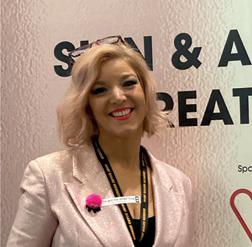
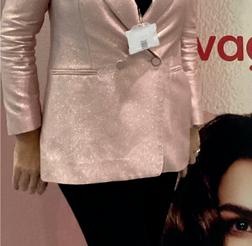




What a blast of a weekend we had at Professional Beauty London in March. We were basking in the glory of beauty inspiration galore! Meeting and chatting with all the glam beauty therapists and salon owners was an absolute delight! The NHBF stall was super busy and so too were some of us NHBF staff who were presenting and taking part in different
in



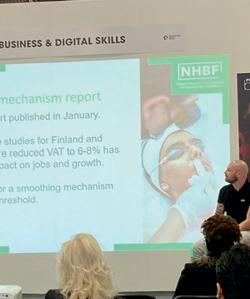







It is with heavy hearts that we share the news of the passing of past NHBF (formerly the NHF) president Harry Walker. Harry passed away peacefully at home on 13 February, aged 79. Our deepest condolences go out to his family and friends.
The Spring Budget was announced at the beginning of March and included items that will directly affect sector businesses. The main points were:
● VAT registration threshold to increase to £90,000 from 1 April
● National Insurance (NI) to be cut by a further 2p from 6 April
● A £200m extension of the Growth Guarantee Fund.
NHBF chief executive Caroline Larissey said: ‘We’re pleased that the government has answered our call for changes to VAT with the raising of the threshold, taking into account inflation. However, there’s more to do.’
She added that the silence on support for apprentices was deafening, and while NI cuts will benefit the self-employed, she questioned where the support is for employers.
‘With wages rising in April, few small and micro-sector businesses can afford to take on staff and apprentices and grow the sector. We call on the government to support these businesses, largely female entrepreneurs, bolstering the high street and championing wellbeing in the community,’ she said.
For more, go to nhbf.co.uk/budget-2024
The NHBF has joined the Banknote Checking Scheme as a strategic partner to help Members safeguard themselves against counterfeit banknotes.
The free initiative provides the latest and most efficient practices for verifying banknotes and staying up to date on current threats. It helps train staff to confidently check notes at point of sale, and it makes sure staff know what to do with a counterfeit note.
The checking scheme comes at a good time as, from 5 June, new banknotes (£5, £10, £20 and £50 ) carrying a portrait of King Charles III will be issued for the first time. There
will be no other change to the existing design, and the banknotes featuring Her late Majesty Queen Elizabeth II will still be legal tender.
For more information, go to nhbf.co.uk/banknote-checking
The NHBF has partnered with Better Health: Every Mind Matters to help you feel good inside and out.
Included in this issue is a tent card that you can put in your salon to help advise both your staff and clients on coping skills for better mental health.
Simply scan the code below or go to nhs.uk/every-mind-matters to access a host of free resources.






An Editorial Advisory Board (EAB) has been formed for salonfocus magazine, following calls for volunteers last year.
The first meeting was held in October and proved productive. Members present included Beverley Bates, Valerie Delforge, Edward Hemmings, Elena Lavagni, Melanie McBreen, Keith Mellen and Dale Sampey.
Ideas and advice to help shape future issues of the magazine were shared with NHBF staff and the editorial team.
The next EAB meeting will be held in April. If you are an NHBF Member and interested in joining, email hollie@salonfocusmagazine.co.uk


In a new regular feature, we focus on an NHBF Member and share their unique story.




shoulder cuts, crops, fades and mullets too, and we pride ourselves on giving people exactly what they want.’
The salon is in a warehouse space with no roadside windows, passing trade or walk-ins. ‘It means we can offer more privacy to clients who require this,’ says Klara. It also means it relies on client reviews and word of mouth for trade.
Barberette was founded in 2012 out of Klara’s frustration at not fitting into the typical clientele for barbershops or hair salons. ‘At that time, I couldn’t find anywhere I felt comfortable having my hair cut,’ she says. ‘I didn’t feel happy in the male environment of barbershops, but I felt equally out of place in the female hair salons. I wanted somewhere in between that I could get my hair cut in a short, contemporary style that wasn’t “just a short back and sides”, and where I wouldn’t be charged high-end salon prices.’ And so, Barberette was born.
Salon name: Barberette
Originally from the Czech Republic, Klara followed her mum, a hairdresser, into the family business. However, annoyed by the cost disparity between what women and men paid for a short haircut, she was determined to make it fairer and more equal – something she felt she could achieve in London.
As a gender-neutral salon, Barberette is a place where anyone can come to get their hair
Owner: Klara Vanova (pictured)
Location: Hackney, East London
Web: barberette.co.uk
USP: The gender-neutral barbershop





AE S THE T e sppa sttyl y e, w whitite e co Ba B rbberere sp s ac ace e w exhi h bi b ti t it i s neei di d sppl
e space has a barbershop style, with a red, black and white colour scheme. As Barberette shares the warehouse space with local artists, it has an exhibition on the back wall for its neighbours and clients to display and sell their artwork.
cut and be charged solely on the work carried out.

Klara adds: ‘Because we offer an off-road space that’s safe, welcoming and non-judgemental (we call it “the hub”, as it feels like the centre of a community), we not only serve a large mix of people from the LGBTQIA+ community, but also women from the Orthodox Jewish and Muslim communities, who feel able to remove their wigs and headwear respectively.’
IG: @barberette_london ly y t. e and n all ll it t e thhe , we mix of f QI QIA+ A omeen n ish h d wh w o feeel e gs s an and d et ette t’ t s thheieir r acce e to d bec e auuse e we w en a dreessserers’s’. ov o e-

‘People come to Barberette because they feel like it’s their home, like it’s their place to belong,’ says Klara. And because it offers ‘services in between a barbershop and a hairdressers’.
‘We focus mostly on above-


THE ‘CCli l coon ‘W ‘ fr f om o ou our r b Ou O r ma m open en no bu but t al also so
‘Client care and thorough consultations,’ says Klara. ‘We are open to suggestions from the client, and we do our best to implement them. Our main goal is that we are open not just for the haircuts, but also for the person.’
It It’s s alsso wh w er e e i to acc c es so somemeth h thhe NHHB Are you with a st NHBF an have hel ho hollie@s ctured) London
‘The NH wi w th co be b en n on is i su sues s li

e NHBF has helped me with contracts, and it has been on hand with other issues like our PPL license. It’s also great to have a website where information is available to access easily. If I need something, I know I can go to the NHBF and I’ll get support.’


Are you an NHBF Member business with a story to tell? Perhaps the NHBF and its membership benefits have helped you and you want to share how? Get in touch! Email hollie@salonfocusmagazine.co.uk
Take part in the salonfocus readership survey and let us know what you really think of your award-winning membership magazine.
Your feedback is highly valuable – tell us what you like, what articles you fi nd interesting, what you want to see more of, and what you would change.
Simply scan the QR code to complete the survey and you’ll also be in with a chance of winning one of two £75 John Lewis gift cards.






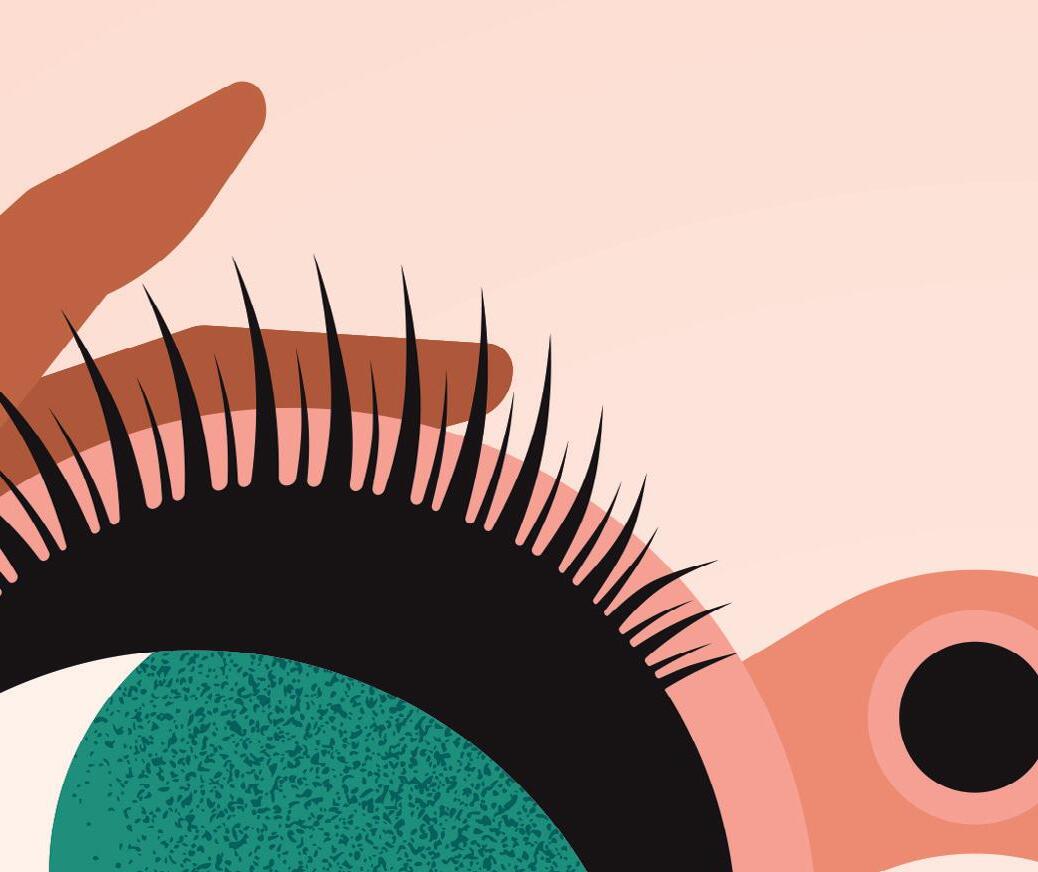




Recruitment in hair and beauty is in crisis, but what can the sector do about it?
 WORDS ANNA SCOTT
WORDS ANNA SCOTT
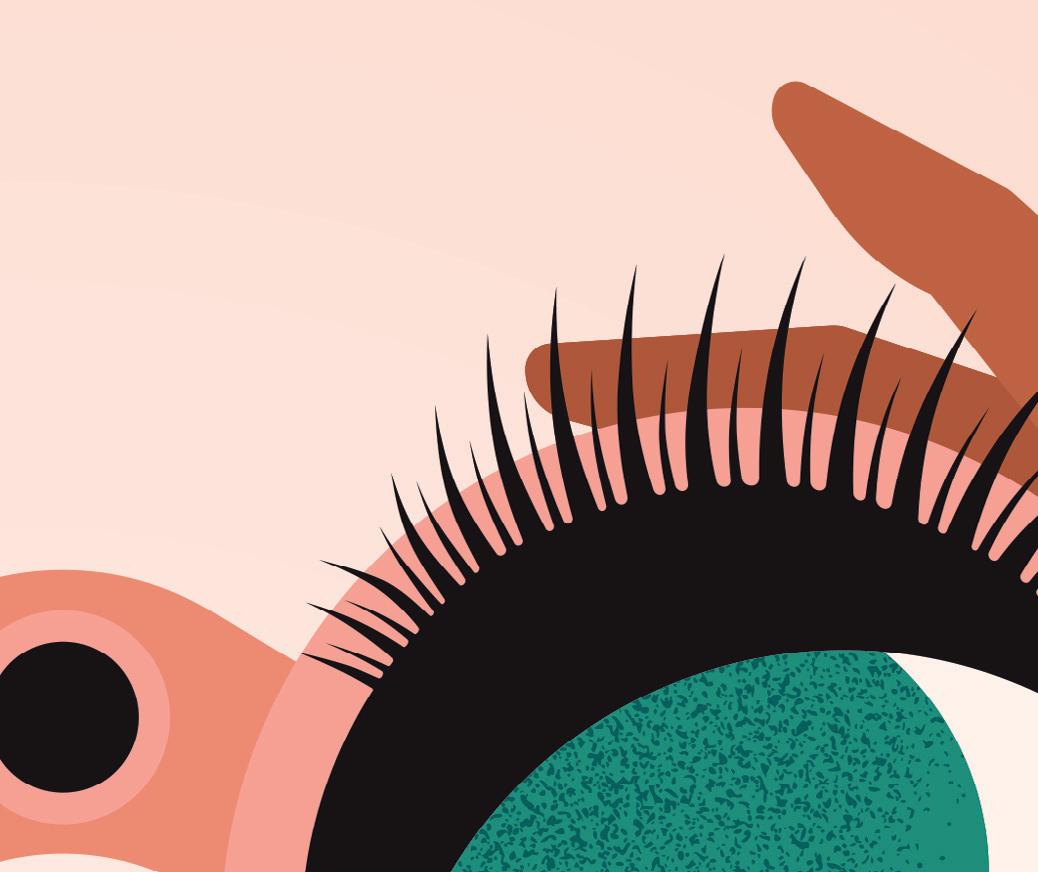


The hair and beauty sector’s lack of experienced staff has been a problem for years. The number of apprentices in England more than halved in the three-year period to 2020, and half of hair and beauty businesses in England, Wales and Northern Ireland had unfilled vacancies in mid 2022. In October 2023, the government called on jobseekers to consider beauty roles – but at the time of going to press, there are more than 5000 live vacancies on the Find A Job portal.
‘The fall in apprenticeships is to do with young people staying in


education, less government funding for taking on apprentices, and rising self-employment,’ says Rosina Robson, NHBF director of policy and public affairs.
‘The quarterly NHBF State of the Industry Survey shows that the salon recruitment intentions of both staff and apprentices have been muted since spring 2023. The sector is in slow recovery post-pandemic, but there is no sign of significant positive change in terms of businesses taking on more staff and apprentices.’

proportion of the industry left jobs to set up on their own, says Valerie Delforge, founder of the Delforge Group, consultants and coaches for the salon and beauty sector. ‘People’s mentalities have changed and working for long hours with little return isn’t motivating them.

Recruitment in the sector has always been an issue, but never more so than since the pandemic, when a large


‘Another issue is that remaining teams are not managed properly, as owners are scared they will leave. Making leadership change and revisiting staff performance becomes sporadic, which can damage growth.’
She has also seen candidates ‘treated quite badly’ during recruitment, deterring them from joining. Equally, owners throw everything at new recruits

– which can be pressurising – or even give them greater power. ‘From what I can see, experienced staff seem to stay where they are: better the devil you know,’ she says.
Financial implications
Scott Fleming, salon director at Wonder salon in Greater Manchester, says the pool of experienced staff is shrinking due to low uptake in the industry. ‘There are people working from home who, even if they wanted to come back to a salon, would struggle to make the shift because of the financial implications. As an employed,


VAT-paying salon, I cannot compete with freelancers who are not paying VAT – straight away they are undercutting us by 20%.’
Many school leavers have also been aff Covid-19 or are leaving school without life skills, says Cathy Foote, owner of Top Floor Hair Studio in Leeds. ‘Paying a young person a 30-hoursplus apprenticeship is around £700 a month. With a couple of part-time chair renters, myself and then the cost of living, it’s a risk.’
g salon, I cannot with freelancers ot VAT away are ng us 20%.’ hool leavers have affected by r are leaving school fe skills, says ner of Top o in Leeds. ‘Paying erson a 30-hoursnticeship is around nth. With a me chair renters, d then the cost of a risk.’

Caroline Larissey, NHBF chief executive, points out the challenge in training 16- to
'WE CAN CREATE DREAM JOBS BY UNDERSTANDING INDIVIDUALS’
Stefania Rossi was working in recruitment when she decided to embrace a passion for beauty and buy Utopia in Hornchurch, Essex.
‘It was a failing salon. There was a lack of culture and strategy, and few controls or processes. It was offering discounts every day and there was no clear identity or brand.’
She carried out ‘spontaneous, honest and beneficial conversations’ with every team member to understand their strengths and weaknesses, what they wanted and what they needed to bring to the job. ‘As salon owners we have a beautiful job, recruiting and finding the right people for our businesses. We can create dream jobs by understanding individuals.’

Larissey, NHBF utive, out the n training 16- to n ber ng port
For Stefania’s team, this meant flexibility, support and empowerment, upskilling and training. ‘Within 16 months we became an awardwinning salon, and 10 years later, very few of that team have left .’ Stefania also takes on apprentices, and has recruited juniors and front-of-house team members.
‘We need to develop a pipeline of talent because our industry is ever-changing.’



PEOPLE’S MENTALITIES HAVE CHANGED AND WORKING FOR LONG HOURS WITH LITTLE RETURN ISN’T MOTIVATING THEM


Look at the structure of work, commission, staff performance and training. ‘Creating a development for each expertise is generating a team who can perform highly in their own field,’ says Valerie Delforge. Analyse the budget, forecast and KPIs.
‘Focusing on each staff member’s development is essential to be profitable, alongside a strong treatment menu and marketing strategy,’ Valerie adds. Develop soft skills such as time management and communication, and organise the right structure. ‘Being aligned with your business is key to attracting the right candidates,’ Valerie says.
Create a full recruitment plan, updated at least annually. ‘Think about when in the year you might need new staff, for example if you are bringing in new treatments or products,’ says Stefania Rossi. ‘It’s also a great opportunity to discuss needs with your team.’
Have job descriptions and ideal candidate profiles ready – even if you’re not hiring. ‘Recruitment should not be reactive,’ Stefania adds. ‘Your team is your biggest asset, so don’t rush to recruit.’
Be creative about your brand – what you offer, your culture, how you are unique. ‘Sometimes we fail to attract the right talent because we’re not communicating clearly,’ says Stefania. ‘I see job adverts that are four pages long.’
Offer flexible working and think about changing your opening hours. For example, you could offer ‘some Saturdays and evenings off with flexible hours’ to retain staff, suggests Rosina Robson. Valerie adds: ‘We are seeing more salons closing on Sundays due to the lack of recruitment, but I believe it can actually be healthy for the wellbeing of the team and owner.’ Grow your own with older apprentices. Consider chair renters, mature cleaners and receptionists. ‘And hold a few sessions with interested school leavers to see if anyone shines – you can offer them a Saturday job and apprenticeship,’ says Cathy Foote.
● Lobbying the chancellor and ministers responsible for the personal care sector and skills, apprenticeships and higher education for employer incentives for apprenticeships.
● Discussing with the DfE how flexi-apprenticeships (allowing apprentices to move between employers and complete their apprenticeship on a self-employed basis) could work.
● Giving detailed written and oral evidence to the Low Pay Commission, which advises government on wage rates. ‘We made it clear that significant numbers of businesses think rising wage rates in 2024 will be unaffordable,’ says Rosina Robson.
18-year-olds who aren’t generating income, as well as paying those returning to the sector the national minimum wage. ‘Salons and barbershops can’t afford the shortfall, and there is no easy mechanism for returners to come back to the sector,’ she says.
‘Training in quite a few colleges is not up to standard either. You only get a realistic understanding of working in the sector by being in a salon or barbershop environment. You can get a realistic learning environment in a college, but it doesn’t fully prepare someone for the shopfloor.’
Valerie believes that candidates, employers and organisations, and government have a responsibility to act. ‘Insurance companies are insuring poor courses and not checking standards. Candidates have too many expectations, from salary to hours, and a lack of motivation to grow further. They believe they can earn more if they are self-employed.
‘We should talk to younger people from 14 to encourage them into the industry sooner.’
The NHBF has also been working with government in several areas (see The NHBF’s actions to boost recruitment).
‘We have provided solutions underpinned by extensive and robust evidence,’ says Caroline. ‘We spoke frankly with the Department for Education (DfE) outlining absolutely devastating skill shortages in our sector and the reasons behind them. As a result we achieved a huge uplift in the Hairdressing and Barbering Apprenticeship funding band.’ It’s a tough recruitment market, and government needs to do more to incentivise employers to take on apprentices. There are also steps salon and barbershop owners can take (see What salon owners can do). As Caroline concludes: ‘Our sector is great at taking people out of their shells, but it’s a huge investment for employers, and the burden shouldn’t continually be on them.’
● NHBF blog – How to recruit the right salon or barbershop team: nhbf.co.uk/recruit-right
● NHBF guide – Recruiting and employing people: nhbf.co.uk/ recruitment-guide














































































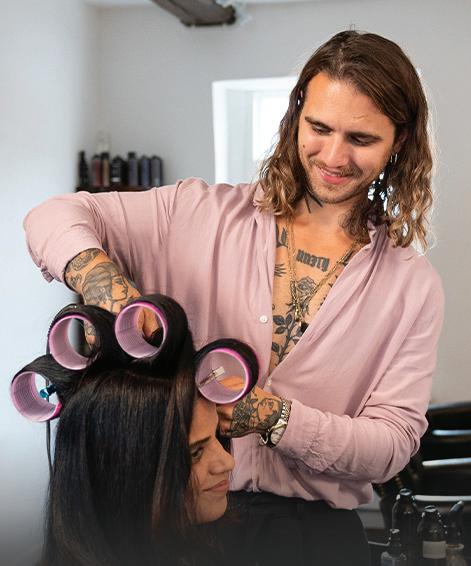
















NHBF



alue added tax (VAT) – which must be paid by all businesses with a turnover of more than £85,000* – is crippling many salons and barbershops (*from 1 April 2024 the VAT threshold increases to £90,000 – the first rise in seven years). The NHBF has been working continuously for the last 15 years towards achieving a fairer VAT system. In our latest project we collaborated with Pragmatix Advisory Ltd, which has released an independent discussion paper (published before the threshold rise was announced in the Spring Budget) exploring how a VAT smoothing mechanism could address the issues with the current VAT system. Here’s what was discussed.
The UK has one of Europe’s highest VAT thresholds, currently set at £85,000 with

1

ic he ct bers.
Rosina Robson explains the VAT smoothing mechanism project and what it could mean for Members.

a 20% tax rate. With no gradual increase in the threshold, the current system is perceived as unfair and a stifl creating a ‘cliff edge’ that discourages businesses from crossing the threshold – and leading to reduced tax revenues for HM Treasury. With 93% of hair and beauty businesses being below the VAT threshold, the sector faces unique challenges. Many businesses resort to cash transactions or split operations to stay below the threshold, fostering disguised employment practices. The discussion paper considers possible options for a VAT threshold smoothing mechanism: options starting at the current threshold and options starting below the current threshold.

ual increase system is fler of growth, couragges e thrreshhold revennue u s for air r and VAT threshold,



Options starting at the current threshold: The report models two options where graduated VAT could start at £85,000 (meaning reduced VAT revenue for the government).








According to the NHBF’s quarterly State of the Industry Survey, there are mixed opinions on the best approach towards VAT:
86% of respondents support a graduated approach
50% believe a reduction in VAT would be beneficial for their business

25% of respondents think raising the VAT threshold would be helpful
7% believe lowering the threshold would aid their business


NHBF chief executive
Caroline Larissey says: ‘We have advocated a smoothing mechanism as part of our campaigning on VAT, but this is the first time we have set out a range of options for how it could work. The presence of the cliff edge within the current VAT regime incentivises businesses to remain below the threshold, forgo much-needed growth and produce a lower tax yield for HM Treasury.
● Reduced revenues: With a moderately graduated option, it’s estimated that HM Treasury would see a loss of £2.5bn in VAT revenue, counteracted by an additional £2bn in increased compliance.
2 Options starting below the current threshold: The report models five options from ‘least graduated’ to ‘most graduated’ where VAT, starting from a lower rate, would increase in steps towards the current standard rate of 20% (without the government seeing any loss in VAT revenue).

‘It’s important to highlight that the report does not make specific recommendations; it is a discussion paper for debate and to engage further with our Members and inform further dialogue with the government and other industry organisations.’ Rebecca Munro, director at Pragmatix Advisory, underscores the need for ‘change based on careful analysis of official data’. The company’s research reveals that around 47,000 UK firms are intentionally staying below the £85,000 VAT turnover cliff edge to avoid the associated costs and inconveniences.
Jonny Haseldine, policy manager at the British Chambers of Commerce, acknowledges the ‘need to minimise administrative burdens on businesses’.
Andrew Goodacre, CEO of the British Independent Retailers Association, supports the proposed reforms, stating that ‘a review of VAT thresholds and smoothing mechanisms is long overdue’.

● Boosted revenues: The report estimates that an additional £25.2bn in turnover would be declared, returning an additional £2.2bn in VAT revenue to HM Treasury, with at least £33m of this coming from the hair and beauty sector.
● Make the admin burden a small share of labour costs: The report estimates an admin cost for businesses (£1000 per business per year in time and software costs), but this would be a small share ( 2.5%) of average sector labour costs.
Looking at success stories abroad, the report examines case studies from Finland and the Netherlands. In the Netherlands, a lower VAT rate of 6% for labour-intensive services in the 2000s resulted in the creation of 4000 sector jobs, showcasing the positive impact of lower VAT rates on growth and employment.

The NHBF’s work on VAT over the years has included several campaigns (see Resources), including different versions of the ‘Cut the VAT’ campaign first launched in 2009. In 2018, the NHBF fed into a
VAT is the third-largest contributor to public sector finances, following closely behind income tax and National Insurance contributions. It makes up 15% of government revenues.
government review of VAT but with no resolution. We have also tried to learn from previous feedback from HM Treasury, including solutions that work for our sector and across the economy. These efforts have aimed to create a more just and fair system for all businesses, promoting greater transparency and reducing the burden on entrepreneurs.
The VAT smoothing mechanism is an important option for long-term VAT reform and something that the NHBF has consistently lobbied for. The report offers up options for debate and the NHBF is discussing these options with government and other stakeholders and business groups.

As we engage in further discussions, it’s essential that the NHBF’s lobbying is evidence-based and that we have facts to back up what we’re asking the government for. The sector stands at a crossroads, and the decisions made in the coming months and years could shape the future of growth and compliance in the industry.
THE CURRENT SYSTEM IS PERCEIVED AS UNFAIR AND A STIFLER OF GROWTH

● Access a summary of the report’s key findings at nhbf.co.uk/documents/ vat-threshold-smoothing
● Access more information on the NHBF’s work on VAT reform at nhbf.co.uk/vat
From blood pressure checks to menopause advice, we discover how salons and barbershops are going further to support the health and wellbeing of their clients.
WORDS EMMA BENNETT
trip to the salon or barbers is, for many, about more than just a quick trim. It’s a chance to relax and focus on self-care, and a place where people often feel comfortable talking about their deepest worries or problems. And with the number of people in the UK living with a major illness set to grow — to 9.1 million by 2040 — healthcare initiatives are taking advantage of this
unique relationship to provide vital services in the community.
In Barnsley, South Yorkshire, NHS and council services have been operating a mobile blood pressure check in local businesses such as barbershops, to free up GPs’ time and catch early signs of heart attack and stroke risk. The ‘How’s Thi Ticker’ initiative referred more than a third of people to pharmacists with high blood pressure.
One study being led by researchers at King’s College London is exploring whether hairdressers and beauty therapists can work with GPs to promote breast and heart health among ethnically diverse women. The BEauty and health community LOuNGes (BELONG) study has been working in partnership with salons in South and West London to train them to use and promote a health app, providing culturally tailored health promotion resources, and directing clients to visit their GP practice for a check-up when needed.
Ashlyn Mernagh-iles, a beauty therapist with more than 40 years’ experience, helped to develop the programme. She says the role of a health adviser is a natural fit for the beauty industry: ‘It’s a very private, intimate space where our clients naturally want to talk about their lives and problems. As a therapist, you are in the perfect position to start those conversations. Clients build strong relationships with their therapist, and it’s common for people to ask us to look and feel all sorts of lumps to get our opinion before they “bother” a doctor with it. Knowing how to point them in the right direction to get the information and help they need is fantastic.’
Dr Mariam Molokhia, a GP and principal investigator for the study, was interested in finding new ways to reach
women from diverse ethnic backgrounds, who may for some reason be discouraged from attending a GP surgery. ‘We have to look outside the traditional models of primary healthcare to foster health and wellbeing,’ she says.
‘Developing these partnerships is a wonderful opportunity to promote health messages and offer
THE HEALTH FOUNDATION ESTIMATES THAT 9.1 MILLION PEOPLE WILL BE LIVING WITH A MAJOR ILLNESS BY 2040 –2.5 MILLION MORE THAN IN 2019
support and resource signposting to the communities, so they will benefit.’
Salons and barbershops are also well-positioned to offer advice and information to their customers that is not easily available elsewhere. The NHBF recently teamed up with campaign and support group Menopause Support to promote its Understanding Menopause booklet, offering information on symptoms and treatment for the much-misunderstood condition.
Diane Danzebrink set up the organisation after her own experience of surgical menopause highlighted how little education and information is available to women. She explains: ‘I knew absolutely nothing about being plunged into surgical menopause, and the loss of oestrogen in particular had a significant effect on my mental health, where I came incredibly close to taking my own life.’
She hopes that, by providing easy access to an online or physical copy of the booklet, salons will help to raise awareness of what menopause is and how it can affect women in different ways. ‘Many salons have mainly female staff and most people going into them are female,’ she says. ‘Some of these relationships go on for decades — most women go to the hairdresser more often than they see a doctor — and this sense of familiarity encourages them to share.
‘Whether you’re a salon owner, stylist or client, menopause is going to happen to you — and indirectly to men — so it’s useful to have a factual evidence-based source they can signpost to, without having to know all the information front to back.’
For many businesses in the hair and beauty industry, being part of a community is about more than offering transactional services. The Not Just a Salon initiative celebrates the steps hairdressers are taking to improve their clients’ health and wellbeing.
When Danielle Garner set up her Dublin salon Wildflower, she wanted to create a calm and welcoming space away from the usual stresses of everyday life. She runs several regular community events, including The Wild Swap fundraiser where guests can refresh their wardrobe in a sustainable way by swapping clothes with others. And the annual Give Back Day on 23 December invites people in need — from carers of terminally ill children to victims of domestic abuse — to enjoy a complimentary treatment.
‘We can get caught up in our own little world and forget about our wider circle,’ says Danielle. ‘If my business were to close tomorrow I would know I did everything in my power to be good to humans, and that’s the most important thing. We’re so disconnected from the world a lot of the time, but when you’re sitting in a chair with an artist looking after you, there’s a sense of vulnerability you can’t hide from. We’re all going through something, and we have the chance to connect on a deeper level.’


Neil Palin, owner of Oriel Close barbershop in Liverpool, firmly believes in making his shop a safe place for clients.
As a mental health first aider, he jumped at the chance to get involved in Hair and Beauty Talk, a partnership between Mersey Care NHS Foundation Trust and the suicide prevention charity Lions Barber Collective. It offers free listening training to hairdressers, barbers and beauty therapists in Liverpool to help them recognise the signs that someone might be struggling.
Neil says: ‘People open up to us more than they might to their wives and husbands. And we’re in a privileged position to listen to them non-judgementally.
‘We’re not psychologists – we’re not here to solve people’s problems. We just listen to them, without offering our opinions, until we can pass them on to someone who is more qualified to help – such as the Samaritans or CALM. If someone is having an issue, they can talk to us and that might make them feel better than they did before.’
● NHBF blog – What you can do to help your menopausal clients in your salon or barbershop: nhbf.co.uk/help-yourmenopausal-clients
● Menopause Support’s free resources: bit.ly/ MS-free-resources
● BELONG study: belongstudyuk. com/copy-of-resources
● Mental health training: thelionsbarbercollective.com

THERE’S A MISCONCEPTION THAT WE’RE CHOOSING TO PULL OUT OUR HAIR, AND COULD MAKE A CONSCIOUS DECISION NOT TO
In the second article of our series on hair loss, we explore trichotillomania – hair pulling disorder – and how to support clients.WORDS KATIE SMITH
Hair loss can affect people at different life stages and for all sorts of reasons, but one common cause is trichotillomania.
Often called ‘trich’, typical behaviours include uncontrollable urges to pull hair from the body, face and scalp. This can result in thinning of the hair, bald patches and discomfort.
While studies are predominantly US-based, statistics suggest 1.1 million people in the UK could have trich. It is one of a group of body-focused repetitive behaviours (BFRBs), which also includes dermatillomania (skin picking) and onychophagia (nail biting). According to estimates, one in 20 people has a BFRB – almost four million people in the UK and Ireland.
Clare Mackay, professor of neuroscience at the University of Oxford’s Department of Psychiatry, has lived with trich for more than 35 years. ‘It started with my eyelashes and the crown of my head, then my

eyebrows. Mine started with trauma – I was bullied at secondary school and found myself excluded socially.’
Shame is a big part of trich, Clare says. ‘People with these disorders will do anything to stop anybody knowing about it.’
TRUE: Many people with trich don’t seek treatment because of shame
FALSE: Those suffering can control the disorder – it’s not that simple
TRUE: People with trich tend to always pull from the same patches, causing bald spots and thinning of the hair
FALSE: Only women experience trich – it’s present in men too TRUE: Trich is often associated with trauma or anxiety, but not always – it can occur on its own.
There are two reasons for this. ‘The first is beauty and attractiveness. Our hair, skin and nails are our peacock feathers. Having a condition that means you don’t look as good as you would otherwise upsets us.
‘The second is it’s something we do to ourselves. There’s a misconception that we’re choosing to pull out our hair, pick our skin or bite our nails, and could make a conscious decision not to. Everybody feels we should be able to control it.’
For a long time, Clare avoided getting her hair cut, or lied about it. ‘I would say “I’ve got some hair loss but don’t know why.” I wasn’t ready to say I was pulling out my hair.’
Hair and beauty professionals can help normalise the condition. So what should and shouldn’t you do or say to clients with trich?
‘Going to my current hairdresser, Susan Handy, is a positive experience – she’s accepted trich as part of doing my hair,’ says Clare (see Case study overleaf) ‘She never tells me off or




asks pointed questions. She’s never made me feel shame – in fact, she said: “I’ve seen this before, it’s no big deal.”’
Before, hair appointments were uncomfortable. ‘In my early 30s, I told a hairdresser I had a bald patch because I pull out my hair. She’d probably never come across this and didn’t know what to do, so she said nothing. I was mortified. She had her hands over my head and I could tell she was uncomfortable.’




Understanding these conditions is key if salons and barbershops are to become BFRB-friendly, says Clare. ‘The best experience I’ve had was when I had my eyebrows microbladed. The person mentioned trich on her website, so before I even walked through the door I knew I didn’t have to explain it. When we did talk about it, she said “It’s just a thing some people have.” She completely normalised it and made it possible to talk openly.’


DOS AND DON’TS
● Do tell clients: ‘I understand that you can’t help it – it’s a disorder and not your fault’
● Do say: ‘Let’s see what we can do together to make you feel as good as you can’

Knowing how to start the discussion is key. ‘There won’t be one right answer for everybody, but with a bit of knowledge you can make a huge difference to somebody,’ Clare says. ‘It’s a tricky conversation, but knowledge is power.’
Raising awareness can help clients feel better and encourage more research. ‘To develop treatments, we need people to come out of the shadows and feel less ashamed,’ notes Clare. ‘I want people with BFRBs to feel able to ask for and receive help.’
● Do advertise your salon or barbershop as BFRB-friendly on your website and socials
● Don’t tell clients to stop pulling their hair – it’s not as simple as that
● Don’t ask pointed questions
● Don’t diagnose –instead, direct clients to further resources and support.


Susan Handy, owner of Mary Handy Hair and Beauty in Henley-on-Thames, prides herself on making clients with trich feel at ease.
‘It’s about building a rapport. For many of my clients, I would gently ask “What’s this all about?” and highlight it in a quiet way. But I would never do that with a client I’ve only been seeing for six months. It’s taken a long time to get to that place and be able to broach it.
‘I would never say “You’ve got trich” to someone. It’s important to instil confidence in your client and not make them feel awkward or ashamed. Give them the opportunity to open up over time, and gently encourage them to seek a diagnosis or help once they have the courage and if it’s right for them.’
For clients with trich whom she knows particularly well, Susan takes photos of their scalps. ‘It’s powerful because they feel it but never see it. It made one client seek counselling and mindfulness, which has helped. Of course, that wouldn’t work for everyone.’
Susan believes salons can be safe spaces for clients with the condition. ‘It’s an honour to be part of their journey. I’ve been thinking that one Sunday a month we could have people who suffer with trich or want to learn about it come into the salon.’
In terms of training within the industry, she adds: ‘There could be courses. All apprentices need to be aware of trich. It’s about making the younger generation of hairdressers look at people’s scalps, be aware of differences, and take photographs.’
● NHBF blog – Offering hair loss solutions in your salon: nhbf.co.uk/hair-loss
● BFRB UK & Ireland: bfrbukireland.com






Weighing up the costs and benefits of entering industry competitions.








 WORDS CLAIRE MOULDS
WORDS CLAIRE MOULDS


You have to be in it to win it – but, in a cost of living crisis, can you afford to enter industry competitions? While cost shouldn’t be the only consideration (see Checklist:
Before you enter), it is a key one.
‘There’s no doubt that entering requires a significant investment of both time and money,’ says NHBF president Amanda Lodge-Stewart.


‘Many can also be put off by seeing the same names winning again and again. It can help if you have a good content writer to prepare the entry form and a good photographer, but this can be expensive. Apprentice competitions are often more accessible. It’s just a shame there aren’t any schemes or grants to widen participation.’
While financial demands on salons and barbershops are at an






all-time high, interest in competitions is soaring. ‘We’ve seen a 5% to 24% increase in entry numbers across our 2023 hair, beauty and aesthetic awards, proving that industry professionals value the opportunity to showcase their work and measure themselves against their peers,’ says Lizzi Brady, head of awards management at the Professional Beauty Group, which organises leading industry awards such as the Professional Beauty Awards, British Hairdressing Awards and Modern Barber Awards.
‘The benefits are immeasurable, from coming together as a team to prepare, to helping staff hone their skills and grow in confidence, to raising the salon’s profile and generating new business,’ adds Amanda. ‘Weighing up the potential gains can put the investment in context, as can seeing how previous winners have benefited from taking part.’




★ Do your research! Look at previous winners, their entries and how they presented their work for an insight into what is expected. Do you need to work on any areas of your skillset?
★ Are you confident you can handle the pressure of producing your best work in front of a judging panel? If you’re unsure, consider entering competitions that require you to submit photography of your work, rather than perform live.

existing clients a reason to return, and new clients peace of mind about the quality of the service.
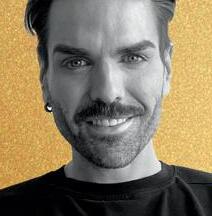

Fergal Doyle won Independent Salon – Business Newcomer at the 2023 British Hairdressing Business Awards.
Fergal says: ‘Since opening, the goal has been to become the best in our industry. Competitions are an opportunity to benchmark ourselves against top-tier talent and be inspired by our peers – if you want to reach the top and stay there, you have to constantly learn and evolve your skills.
‘Winning awards has boosted team morale and they have an immense sense of pride knowing they’re working in one of the best salons in the country. It gives
‘We have a budget for marketing, including competitions, which is reviewed quarterly to ensure we’re seeing a good return on our investment. Photoshoots are the biggest expense, but last year, pulling in favours from clients, friends and industry colleagues, we managed to shoot two collections on a shoestring.
‘While I’m fiercely competitive, I enjoy the creative process as much as winning. On the occasions we’ve not won, it’s spurred me on to come back the following year with bigger and better ideas. It’s also important to remember that just putting your work out there to be judged is a massive achievement – not everyone has the confidence to do so.’


★ Set a budget. Models, professional photography, travel expenses and the cost of your time all add up – not to mention event tickets, travel and accommodation if you attend an awards ceremony. Consider:
- Does it make sense to enter a less expensive competition this year or save up and enter a costlier one next year?



- Do you feel you have an especially strong entry this year that is worth the investment?




- Are you already turning customers away, or would winning give the business a boost and increase footfall?
th mers uld iness st and rease ootfall?
















★ Make a note of the competitions you want to enter and their key dates.









★ Be clear on the rules. Every competition has its own requirements – double check them all.

★ Different competitions score entries differently. Find out how you’ll be judged and what criteria is used.








★ Practise, practise, practise! Ask for feedback from peers and, if you know someone who has successfully entered competitions previously, see if they will mentor you.
ore out and k ow someone cessfully entered ons I T ' S G R




















IT'S GREAT TO BE ABLE TO BLOW YOUR OWN TRUMPET AND GET INDUSTRY RECOGNITION

Maximise your return on investment by:
★ Ensuring your website, social media and email signature showcase the win within 24 hours
★ Including a news story or blog post on your website with images from the event

Don’t forget, it’s free to enter the NHBF’s Top 100 Influencers Index, which celebrates the top hair and beauty influencers on social media. Look out on NHBF socials (@nhbfsocial) for when nominations are open for 2024!

★ Deciding where to display the award for utmost impact
★ Contacting your local and trade press to publicise your achievement
★ Holding a celebration event. Invite existing customers to bring a friend – to generate future business – and offer live demonstrations, product samples, discount vouchers and a glass of bubbly to toast your success.





Niamh Kavanagh, Gypsy Rose Salon: ‘Awards are great for morale. As a business owner it can be cult and isolating, and it’s great to be able to blow your own trumpet and get industry recognition. The bar is so high, though, that you must be sure both your work and the entry will stand up to scrutiny and be worth the investment.’

Sam Sheldrake, Gelicious Nails: ‘I’ve been entering competitions since 2019 and have had a variety of experiences. While many have been extremely professional, some have been badly run, some have operated more as a “popularity contest” and some, while “free to enter”, have then asked you to pay a £100 fee once you become a finalist.’

Julie Wallis, WALLIS@25: ‘I entered my first competition – the L’Oréal Colour Trophy – when I was 17, and I was hooked. They make you a better hairdresser and are brilliant for networking. I’ve had some of the best times of my life competing as an individual and as part of a team – and nothing compares to the buzz of a live competition floor.’


● NHBF blog – The importance of awards for your salon or barbershop: nhbf.co.uk/ entering-awards
● NHBF Top 100 Index: nhbf. co.uk/top-100-influencers

 IMAGES: ISTOCK / SHUTTERSTOCK
IMAGES: ISTOCK / SHUTTERSTOCK


















Making sense of sustainability can be tricky – we explain some of the frequently used eco-terms and logos.WORDS KATHY OXTOBY
Consumers increasingly expect sustainability from businesses – including salons and barbershops.
The British Beauty Council’s 2020 report TheCourage to Change revealed that two-thirds of people want brands to do more to help the planet, while 88% want brands to do more to help consumers make a difference. And according to anecdotal feedback from businesses, ‘positive sustainability practices can help staff recruitment and retention’, says NHBF director of policy and public affairs Rosina Robson.
However, sustainability jargon and logos can be confusing. Terms such as ‘greenwashing’ and ‘B Corp’ are bandied about, but what do they mean?
Sustainability involves ‘different elements’, says Jess Rigg, project manager at Green Salon Collective (GSC), which recycles salon waste from salons across the UK and Ireland. ‘It might include recycling, or using a product with vegan ingredients,’ she adds.
‘Sustainability is not just talking about the environment, but also being ethical,’ says Keith Mellen, director of Anne Veck Ltd and author of Salon RE:Source. ‘It’s about people and planet.’
Here, we look at and explain some of the buzzwords around sustainable and ethical products.























































































VEGAN A vegan product contains no animal products, but this does not guarantee it’s cruelty free. Vegan salons ‘must have no animal products’ in them, says Keith, so you will need to research suppliers. And be aware that the Vegan Society trademark ‘applies to the product – not the company that produces it’, he adds.












A cruelty-free product is not tested on animals, but may still contain animal products. Many cruelty-free products display the Leaping Bunny logo on their packaging, which guarantees no new animal tests were used in the product’s development.


Greenwashing is when a company markets false or exaggerated sustainable efforts. The Competition and Markets Authority and its Green Claims Code (greenclaims. campaign.gov.uk) is a good source of advice on greenwashing. Claims should be truthful and accurate, clear and unambiguous, shouldn’t hide or omit important relevant information, and comparisons must be fair and meaningful. Claims must be substantiated and consider the product or service’s full lifecycle.
Certified B Corporations such as GSC have undergone vigorous testing and verification by non-profit network B Lab (bcorporation. net/en-us) to ensure they meet high standards of social and environmental performance, transparency and accountability.

Fairtrade manufacturers pay fair prices to producers and exporters in developing countries, and insist on better social and environmental standards. Keith says: ‘Fairtrade says to clients: “We’re ethical, we care, and we’re sustainable.”’

Net zero or carbon neutral businesses do not add to the total amount of greenhouse gases in the atmosphere.
Our carbon footprint is the measure of carbon emissions associated with our consumption of goods and services.
An ethical supply chain tackles sourcing in the most sustainable way possible, so people aren’t being harmed. For example, it will exclude child labour, but include fair wages and safe working environments that don’t harm the planet through pollution, harmful ingredients or failure to recycle.
Renewable energy
‘comes from a source that isn’t depleted, such as solar or wind energy’, explains Jess, and ‘is helpful for salon owners who want to reduce carbon emissions’.



Every business will have different requirements for its purchasing policy, says Jess. ‘You might want to be vegan and cruelty free, or want everything to be recycled. Write down what’s important to you and consider whether new products fit with your values to create a purchasing policy that’s ethical to you.’

‘We make decisions about purchases based on a range of issues,’ says Melanie McBreen, salon owner and educator at Changes Hair Salon, Milton Keynes. ‘For example, we have Fairtrade refreshments and








Anne Butterly, founder and CEO of Easydry, says: ‘I founded Easydry to develop a sustainable product that outperformed cotton and paper towels. The Easydry disposable towel is an alternative to traditional cotton towels and inefficient laundry practices. It’s biodegradable, 100% compostable and contains 0% plastic.’
The towels are made via a technologically advanced process with wood pulp and, importantly, no chemicals are used during this ecofriendly process. This means the towels can be disposed in general, recyclable or compost bins. They fully decompose within 12 weeks, eliminating any threat to the environment, regardless of where they end up, unlike cotton towels that take years to breakdown.
‘Our product range, for a four- to eightstylist salon, results in a 21% reduction in CO2 emissions and a 120,000-litre reduction in water use a year. Our towels and packaging are Forest Stewardship Council certified [see uk.fsc.org] and we’ve achieved B Corp Certification.’
vegan product options.’ She says salon teams need to understand, and buy into and contribute to owners’ ethical purchase decisions, which will also help them respond to client queries about sustainability.
More can be done to make sustainability easier. ‘I’d like to
The NHBF’s focus is on providing quality and accessible sustainability advice to Members, including on net zero, energy efficiency and waste reduction. ‘We use our communication channels to promote advice, guidance and best practice case studies,’ says Rosina.

The NHBF has partnered with the GSC since 2022, ering a 15% discount on the joining fee and access to salon recycling services and business advice. And along with sustainabilityrelated blogs, the NHBF provides a toolkit on its website, signposting businesses to the Salon
RE:
RE:Source guide and the Net Zero Hair Salons Climate Action Playbook (see Resources).
see less jargon, more simplified language and messages that are relatable to salon owners, teams and clients,’ says Melanie. With so many different terms and certifications, says Jess, it’s important to think about ‘how your actions and business decisions will affect the planet and people, and make choices with those in mind’.
● NHBF blog – Sustainable salons and barbershops, from veganism to plastic-free options: nhbf.co.uk/sustainable
● NHBF blog – Running an eco-friendly salon: nhbf.co.uk/eco-friendly-salon
● NHBF sustainability toolkit: nhbf.co.uk/sustainability-toolkit
● GSC: greensaloncollective.com
● Salon RE:Source guide: bit.ly/SalonReSourceUK
● Net Zero Hair Salons Climate Action Playbook: netzeronow.org/hair-salons





Do you have a business strategy?
We seek expert advice on why it’s important and what it should include.











A strategy helps you focus on your business decisions, explains Sam. ‘This can be as broad as recruiting new employees, offering more services to clients or expanding. Strategies can break down your vision into manageable chunks that will enable you to set achievable goals and, most importantly, be able to monitor them.’
A strategy is more longterm than a plan, Craig suggests: ‘Strategy first, then a plan, where you break down areas that need action to implement your ideas.’

Sophie says: ‘Most salon owners have come from being awesome [at their trade] – we aren’t taught business during our training and this makes it hard for us to understand how to make our salons successful. Not having a business strategy is like going on a road trip without a destination or directions to get you there. If you ever got there it would be one stressful trip.’
Sam adds: ‘Having a business strategy in place allows you to set up targets and use key performance indicators that will help you measure your success.’

‘Having founded, built and sold a high-street brand, I understand the need for a comprehensive strategy,’ says Craig. ‘Everything starts with a great deal of thinking time.
‘Ask yourself questions like: Where is the market going? What do my potential customers really want (and what’s not being offered by others in the market)? What could a competitor do that would annoy me (because it’s a great idea)?
‘I’ve listened to the audiobook of The Road Less Stupid by Keith J Cunningham and found it essential to understanding the necessity for thinking and asking yourself questions.’
































VISION: ‘Due to the huge increase in freelance/home hair, I knew we had to offer a destination salon. This was the number one element of my strategy,’ says Craig. ‘The result is a larger salon that encompasses a cool coffee shop and home interiors area, while also being a unique place to be. This can’t be offered by home hairdressers.’
SOLUTIONS: ‘My strategy is simple – take really great care of your team members,’ says Sophie. ‘Learn to look at your team’s individual strengths and focus on utilising them to propel your business forward. For example, not all your team are going to be great at social media – that’s fine, as long as someone is and, if not, seek someone who is an expert to help.’
TRACKING: ‘I think a business strategy should always include a plan of

‘It’s valuable for all team members to know the end goal and the part they all play in getting your business there,’ says Sophie. ‘It definitely takes a village to run a successful salon! Everyone needs to be on the same bus and trust the person driving it – this comes from having a clear goal and strategy.’
Sam agrees: ‘Sharing your strategy with your team will give them the opportunity to ask questions and have a clear view as to where the business is going – you want your team to feel part of your vision and understand how they can help you get there. We always encourage an open and transparent conversation between teams to ensure everyone is working collaboratively.’



should include a of execution (how am I going to do this?) and a reporting process that clearly outlines what you have achieved so far, which can be as regular as you like – monthly, quarterly or annually – whatever works for you,’ says
Sam.






‘Regularly update your plan, ideally every six months, and after major changes like staff alterations, new partnerships or significant external factors impacting your business,’ Tina advises. ‘Store your updated plan securely and discard outdated versions to avoid a mix-up.’
‘Any change or disruption in your business needs a revisit to your strategy to see if you need to move in a different direction to ensure success stays on course,’ adds Craig. ‘This disruption could be a change in the market, like we all witnessed during and after Covid.’





For advice on various aspects of running a business, check out these NHBF blogs:
● Reviewing staff performance and setting performance targets: NHBF blog – Managing staff performance in your salon or barbershop: nhbf.co.uk/ managing-performance
● Finding a clear brand identity and why it matters: NHBF blog – Building your brand: nhbf.co.uk/building-your-brand
● Updating your business plan and why cashflow forecasts are vital:
NHBF blog – Grow your salon or barbershop profits and business: nhbf.co.uk/make-yoursalon-profitable
● Advice on recruiting: NHBF blog – Reward your salon or barbershop team for long-term success: nhbf.co.uk/retaining-staff

‘Not having a clear, up-to-date strategy really affects the team,’ reflects Sophie. ‘The times when I feel my business has lost its “oomph” and the team is less enthusiastic always comes from a lack of focus on the business strategy on my part. But it’s an easy fix by reinstating the plan and getting excited about it again.’
Sam adds: ‘The main risk is a lack of direction. If you want to increase your revenue then you need a plan that will give you some accountability and an overview of what needs to change to meet that goal.
‘I see a business strategy as being a great starting point that sets the tone for improvement and progression. That’s why being able to accurately report on your development is really important – it allows you to develop the plan so you don’t set yourself up to fail.’






Knowledge is power, and two crucial information-sharing tools for employers are appraisals and exit interviews. Do them well and they can boost staff engagement and offer some important home truths.
WORDS PETER CRUSHAround 30% of employers never run an appraisal with staff, according to research by breatheHR, while 21% of workers need to request them. Not only is this a wasted opportunity to share progress and find out how staff are feeling, but spending time with staff also provides a chance to motivate them and show them how valuable they are.
HR adviser David Wright says the same value can be applied to exit interviews.
‘Owners may think they know why someone’s left, but often that’s not the reason. This is your opportunity to find out. You can identify trends that can inform your company strategy and how you’re perceived as an employer.’ But what makes for a good appraisal or exit interview?
1 PREPARATION: ‘Schedule appraisals in,’ says David. ‘It’s easier with new joiners, as catch-ups may be linked to probation, but after that, keep them in the diary so there’s an expectation that reviews are part of their employment.’

2 BE CONSISTENT: In addition to a more structured annual or bi-annual appraisal process, have conversations throughout the year that are more than just a quick snatched chat, advises Laura Williams, head of team at WorkNest Law.
It is also important to be consistent with all staff and not single anyone out, unless a separate conversation is warranted because of poor performance, she adds – this will avoid accusations of discrimination. ‘Give it dedicated time and make it a grown-up conversation, perhaps using a questionnaire to keep


things consistent and on-topic and open up the conversation.’
3 SHARE QUESTIONS IN ADVANCE: People find it hard to say what they think when asked an awkward question on the spot, so underline areas to cover in advance (especially for exit interviews). But there’s a tightrope to walk: ‘Advance warning is good, but don’t make things look too much like a tick-box exercise,’ says David.
● Ask open questions: ‘This is particularly good for exit interviews, where you want to find out more,’ says NHBF Board member Carolyn Sweeney, owner of Creations Hair & Beauty. She tends to ask three basic questions:
1 What have been the best things about working for us?
2 What’s your reason for leaving?
3 If you came back, what would you expect us to do differently?
● Keep things relaxed: ‘The worst thing you can do is unleash a year’s worth of frustrations,’ says Laura. ‘While having people leave is painful, an exit interview keeps things professional, gives you an opportunity to learn and helps people leave on good terms.’


The grass might not always be greener ‘Exit interviews might be hard to give, but if you make great people feel listened to, they’ll leave on good terms, and may want to come back if things don’t work out where they went to,’ says Carolyn. ‘We’ve had lots of people return because we didn’t make them leaving a personal thing, but listened. The grass isn’t always greener, and they’ll remember being treated well at their previous employer.’

● Get staff involved: ‘The more staff feel involved, the better,’ says David. ‘I advise asking the person leaving to help write the job description for their replacement – especially if they’re leaving because the job was not how they envisaged it.’
● Use the information: ‘The exit interview is only half the deal,’ says Laura. ‘It’s how you use the information that matters – for instance, perhaps people are leaving because of a particular manager. They might need further investigation or training.’
● Celebrate! ‘Appraisals are about celebrating great work, so give praise where due,’ says Carolyn.
● Surprise people: ‘I’d always recommend mid-year reviews as a minimum, rather than every 12 months, so nothing is really a surprise,’ says Laura.
● Take it personally: ‘It’s hard when people tell you why they’re leaving,’ says Carolyn. ‘But this is normal,
so take the positives. I’ve been told I didn’t communicate well, so that’s something I’ve needed to improve.’
● Lose focus: At Creations Hair & Beauty, appraisals are not only regular, but purposeful – they’re weekly for new joiners, monthly for those at the next stage, and every eight weeks if people aren’t hitting goals. This gives appraisals a focus and stops them being meaningless over time. ‘We’ll talk about measurable things – client retention rates, upselling, client feedback,’ says Carolyn.
● Reprimand without reason: ‘This is a big no-no,’ says Carolyn. ‘You can’t criticise someone if you’ve not previously given them support.’
● NHBF blog – Managing staff performance in your salon or barbershop: nhbf.co.uk/ managing-performance
● NHBF performance appraisal form: nhbf.co.uk/appraisal-form













We asked for examples of your latest work and you delivered! Here’s what you had to show us.
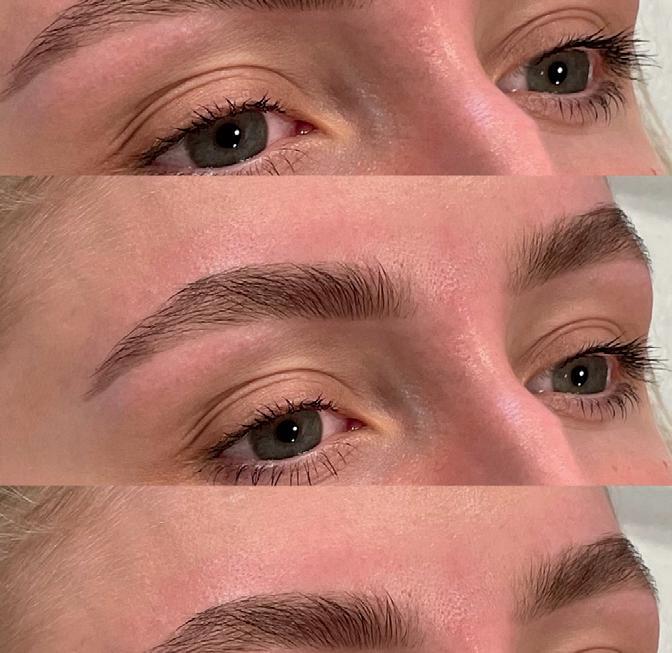



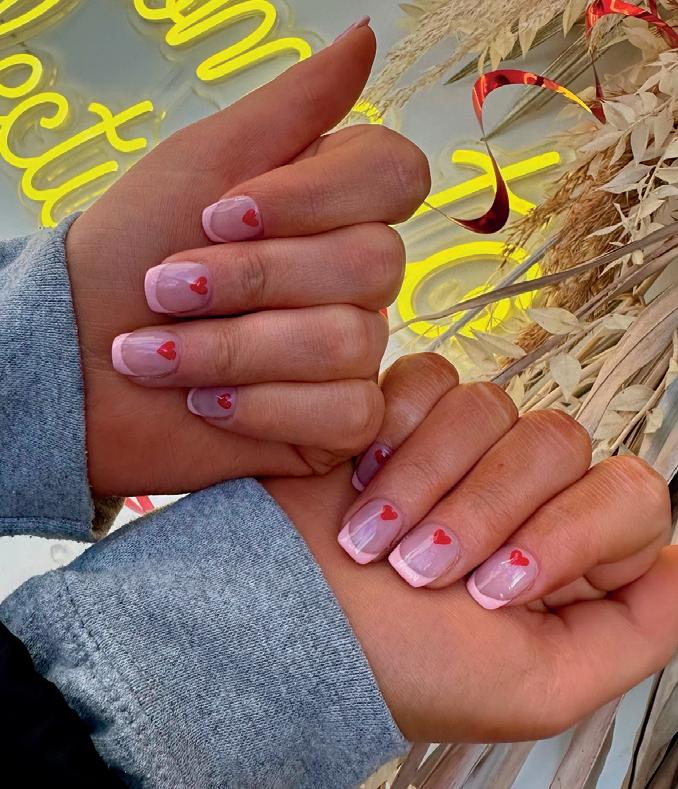
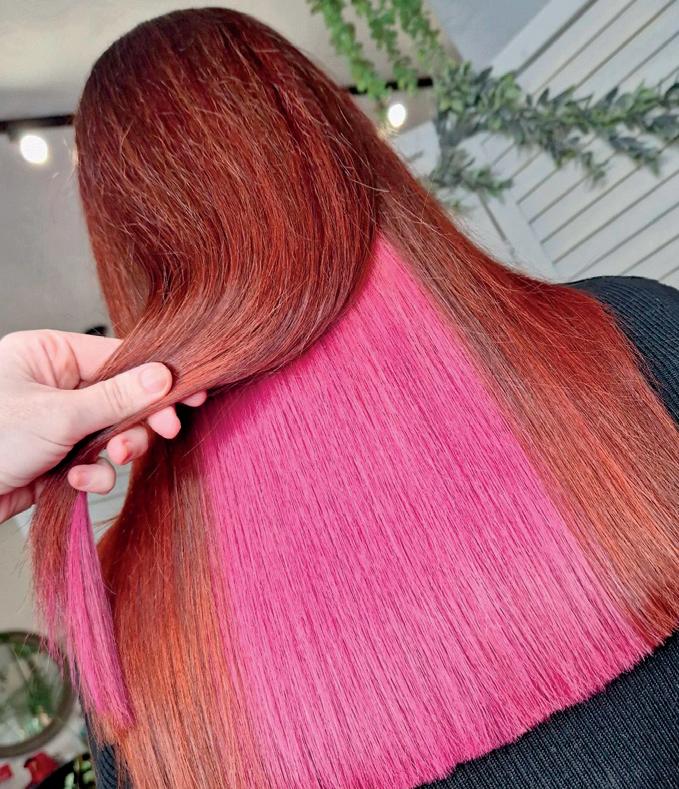

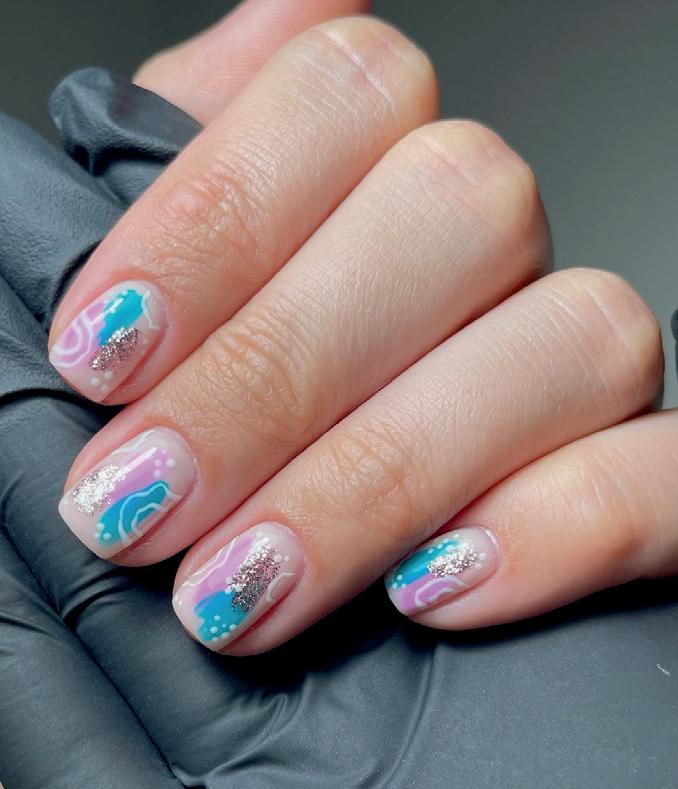



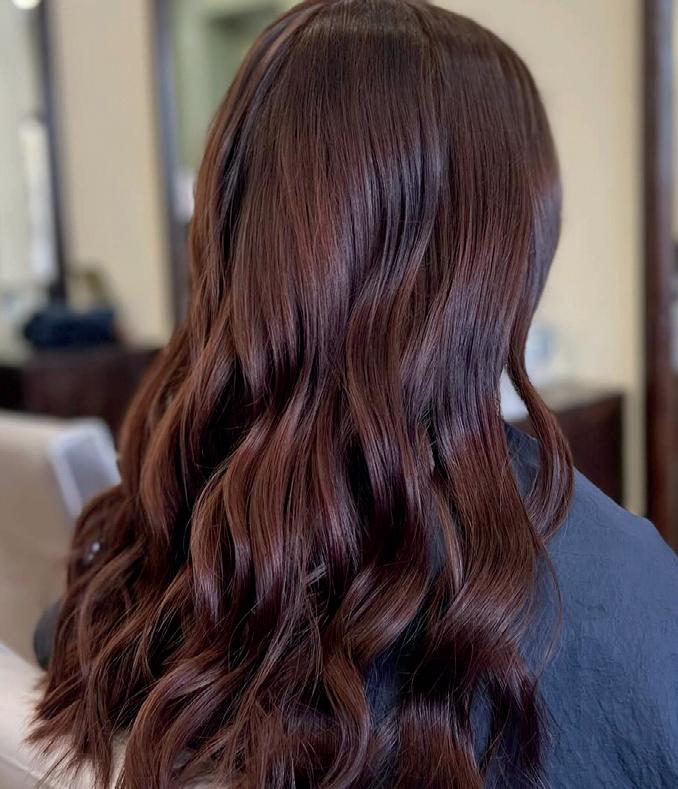

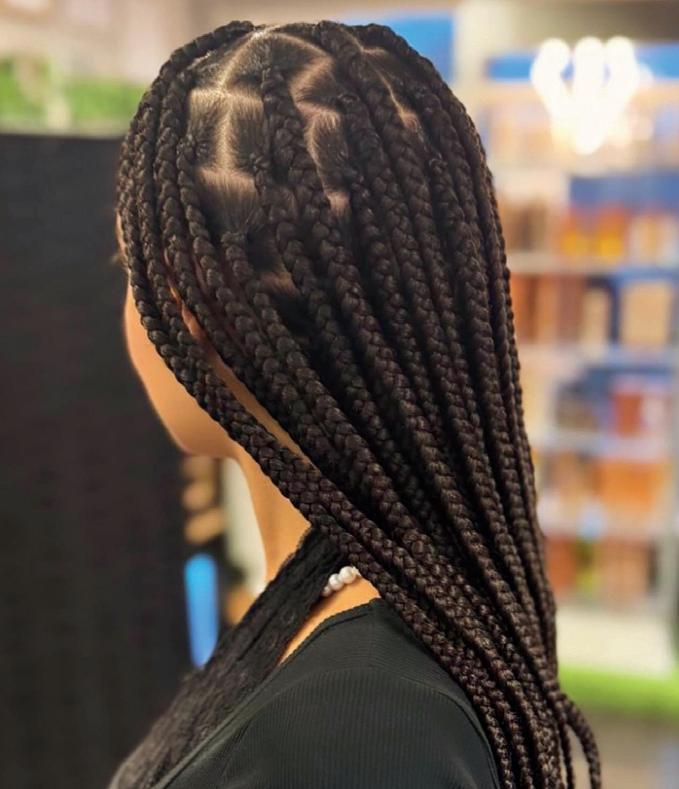

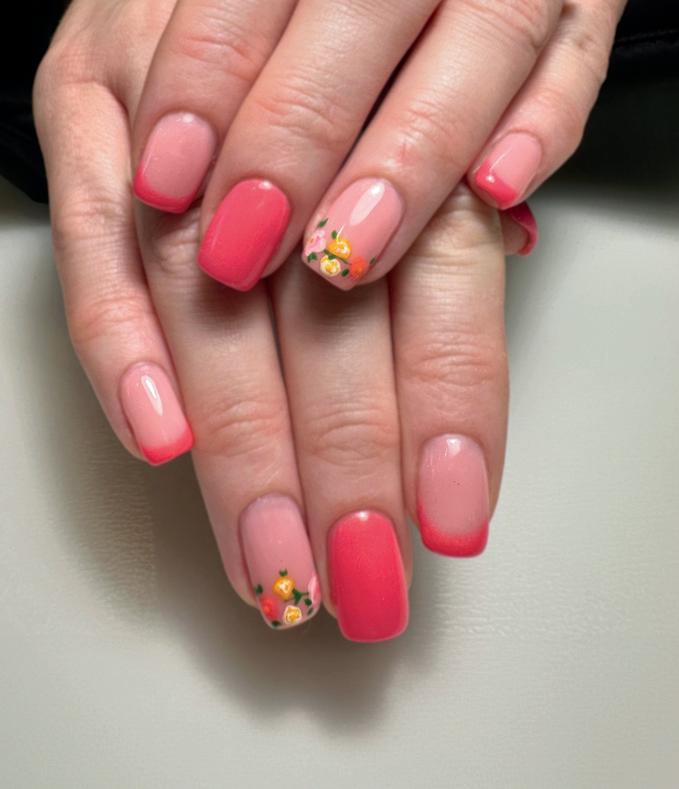

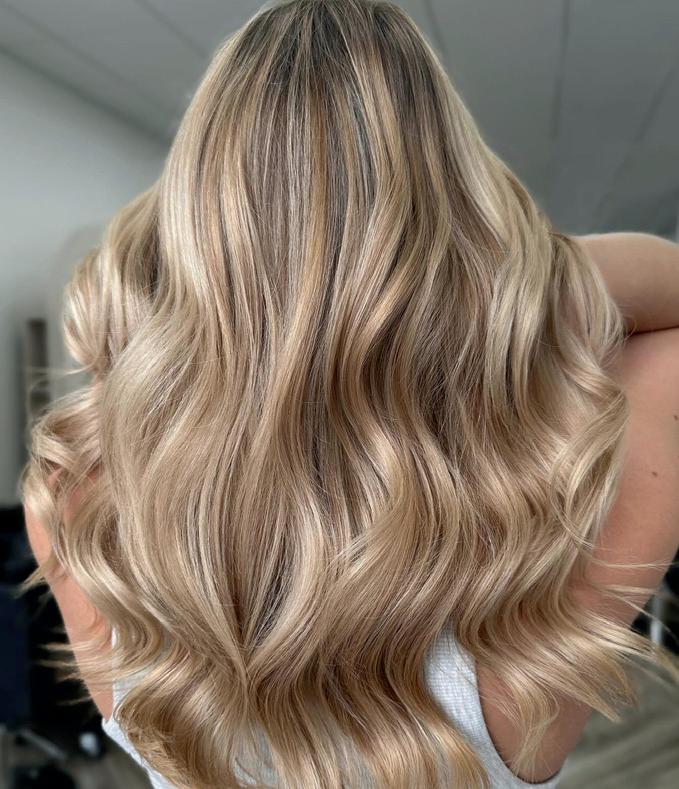





Have you created a style that you’re particularly proud of and want to shout about? Then post a picture to Instagram with the hashtag #salonfocus or tag @nhbfsocial and your shot could be included on these pages.
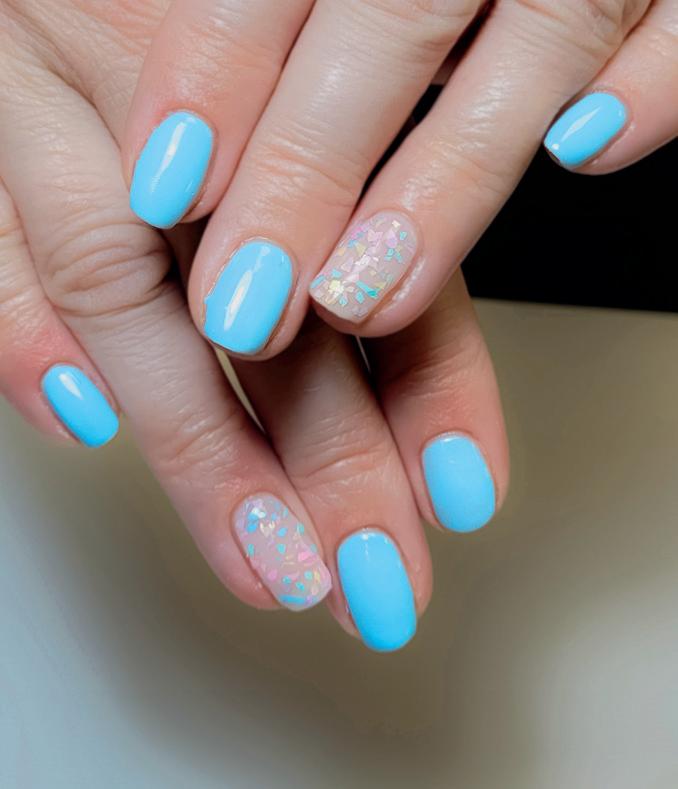




 @katieanne_hair_ Basingstoke
@xnailfairyx Shifnal
@_belindashairandbeautyaccademy Sittingbourne
@magic_hair_wizard Exeter
@gelicious_ellesmereport Ellesmere Port
@armstrongcuthbert Chiswick
@copperqueeneducation Thetford
@katieanne_hair_ Basingstoke
@xnailfairyx Shifnal
@_belindashairandbeautyaccademy Sittingbourne
@magic_hair_wizard Exeter
@gelicious_ellesmereport Ellesmere Port
@armstrongcuthbert Chiswick
@copperqueeneducation Thetford
Whether you embrace them or buck them, we take a look at the latest trends.
Pinb
U
Pinboard site Pinterest has revealed the emerging trends for this year in its report Pinterest Predicts 2024. With 482 million people using the site to plan everything from décor and food to hair and beauty, Pinterest has a unique insight into what’s likely to be big next. The trends predicted to influence the sector are:
Make It Big – this trend suggests hair and beauty requests will be bigger, bolder and bouncier, with the search term ‘wavy perm men’ up 50%, ‘big braids hairstyles’ up 30% and ‘big bun’ up 230%
Be Jelly is all about the jellyfish aesthetic. Have you had anyone request a ‘jellyfish haircut’ yet?
The term’s search is up 615%!
Hot Metals suggests people will be trading in their beloved neutrals for cool silver tones and bold chromes. The search term ‘nail art metallic’ is up 295%.
the e its re 482 m to ha uniq be b influ Mak hair bigg the s 50%, and Be Je aesth requ The t tradi s meta
Blue nam the f searc nails quin 85%) uplo
Blue Beauty is as the name suggests, with the following trending search terms: ‘fun blue nails’ (up 260%), ‘blue quince make-up’ (up 85%), and ‘aqua makeup look’ (up 100%).




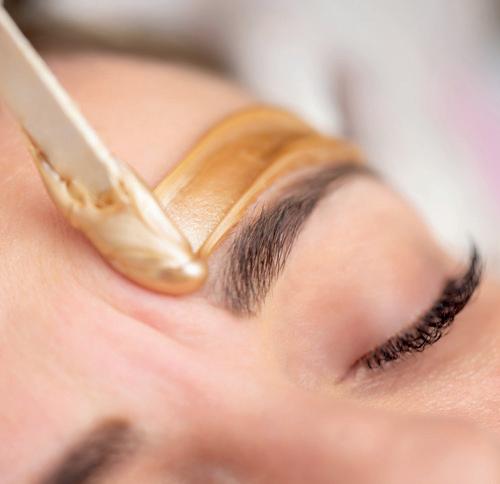
By 2028, the global aesthetics market is predicted to nearly double in value to $25.9bn. The NEXT report by pharmaceutical company Galderma predicts six key trends that will drive demand and shape the future of aesthetics:
HAD ANY THOUGHTS ABOUT WHAT YOU’VE READ?
TELL US ON OUR SOCIAL MEDIA PLATFORMS @NHBFSOCIAL

Proactive Beauty – combining aesthetics with skincare, nutrition, health and wellness
Mindful Aesthetics – transparency, accountability and ethical impact
Fast Aesthetics – treatments designed for temporary life states
Beauty Fandom – bridging the gap between filters and reality Expressionality – going beyond a ‘one-size-fits-all’ approach
Cancelling Age – an attitude shift towards ‘preservation’.
The report adds that the trends are being influenced by three ‘macro movements’: increasing accessibility, advances in science technology, and social community.
Waxing appears to be trending suddenly, according to online review platform Yelp. The company has released its beauty and wellness trends forecast for 2024, and it claims that searches for waxing services surged nearly 700% in the last year. Could it be to do with the resurgence of the skinny brow, which has 86.3 million TikTok views? Also making waves is the waterless pedicure. According to Yelp, searches were up 177% compared to last year. Other trending topics were to do with self-care and included infrared therapy and cold plunge therapy.
Insurance company Hamilton Fraser reveals the results of its annual survey of aesthetics practitioners across the UK and Ireland:
Respondents’ top trending treatments:
Botulinum toxin >> 79.7%
Dermal fillers >> 76.1%
Skincare >> 56.9%
Chemical peels >> 47.1%
In terms of trends, the greatest interest was in aesthetic regenerative procedures, with 64.1% stating this was an area they were interested in.
‘Prejuvenation’ (treating younger patients with preventive treatments) was also popular, with 58.2% of those who responded citing it as a top trend.
43.1% of practitioners were excited about new applications for radiofrequency microneedling
Access the full results of the survey at bit.ly/HF-survey-24



Embrace menopause with confidence using Watermans’ Menopause Relief Kit
Designed to support you or your clients through this chapter with confidence, the kit includes shampoo, conditioner, scalp elixir and Allevi8 supplement capsules to offer life-changing benefits that have already helped so many.
The journey towards a brighter, more balanced menopause experience starts by ordering the kit and transforming your journey into one of empowerment.


The former salon owner turned entrepreneur shares her journey to award-winning success with her brand Watermans.
Hormonal hair loss is where my journey began… After having children, I couldn’t grow my hair past my shoulders despite trying all the products. I thought: ‘I’ve got to do something about this.’ My husband Matt experienced hair loss too, so we decided to research our issues and create our own product.
By mixing up creams in our kitchen… and trialling the products ourselves and on clients in my salon, we found a formula that worked as a shampoo and could be manufactured – and Watermans was born.
Matt and I eat, sleep and breathe our business… which makes taking time off a challenge. Unlike 20 years ago, everything to do with the business
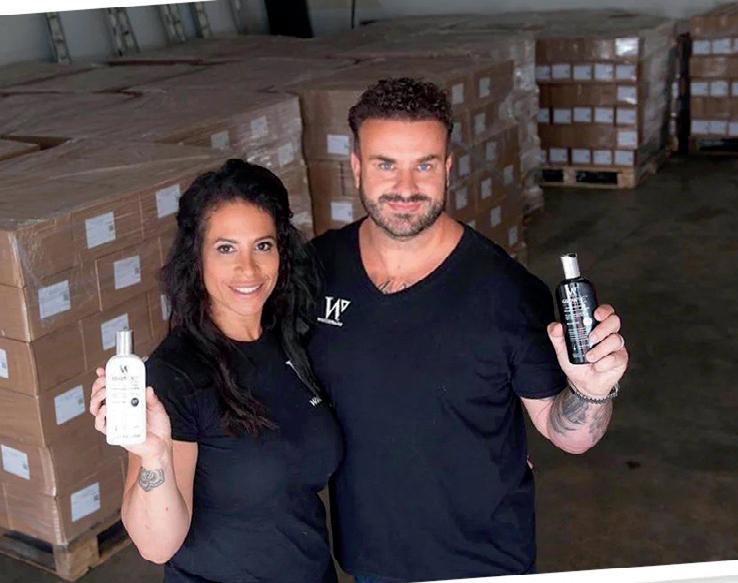



is now linked to our phones – from finances and marketing to the various social media accounts, all of which we run ourselves – so it’s impossible to fully switch off
I have come across obstacles in business as a woman… and as a woman of colour, because people don’t think you have power or are worthy of running your own business. I share the business equally with Matt, but people – mainly men – will often want to talk to him instead of me, which is frustrating. However, Matt makes it clear that I’m the person they need to speak to.

We try to give back where we can… from donating shampoo to chemotherapy wards in our local NHS hospitals, to sponsoring and providing kits for local grassroots football clubs. Our community and helping people are really important to us.
We’ve not lost our sense of who we are… Matt and I have achieved so much in the last 12 years, but we’re not shy about getting our hands dirty. If we need to help with packing products or loading boxes, we do. It’s just pure hard work.
People may not know… I have 17 dogs, from dobermans and rottweilers to Caucasian shepherds and a French bulldog. I also have a micropig that’s not so micro anymore, as well as sheep, goats and a donkey. Our house is like a farm!
2012 – company founded by Gail and Matt £7m – turnover in 2022
2022 – wins the Queen’s Award for Enterprise 2023 – Gail is a finalist at the Black British Business Awards
2024 – Yorkshire Business of the Year Award finalists
In 2024 we’re going to… sponsor Miss England – which is really exciting. We’re bringing out some additional product ranges too, including one line solely for Black hair that will be for general use, not hair loss. We’re also introducing a gorgeous plumping lip balm, which naturally plumps lips in 30 days. Watch this space!














